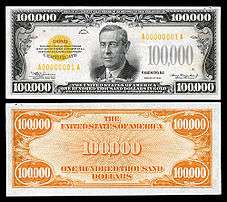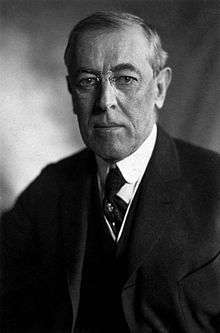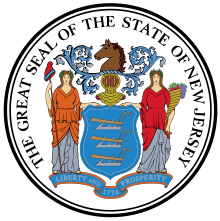Woodrow Wilson
| Woodrow Wilson | |
|---|---|
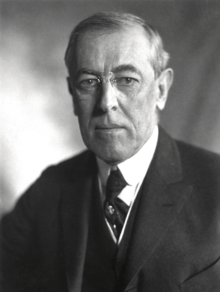 Wilson in 1919 during his second presidential term | |
| 28th President of the United States | |
|
In office March 4, 1913 – March 4, 1921 | |
| Vice President | Thomas R. Marshall |
| Preceded by | William Howard Taft |
| Succeeded by | Warren G. Harding |
| 34th Governor of New Jersey | |
|
In office January 17, 1911 – March 1, 1913 | |
| Preceded by | John Franklin Fort |
| Succeeded by | James Fielder (acting) |
| 13th President of Princeton University | |
|
In office 1902–1910 | |
| Preceded by | Francis Patton |
| Succeeded by | John Aikman Stewart (acting) |
| Personal details | |
| Born |
Thomas Woodrow Wilson December 28, 1856 Staunton, Virginia, U.S. |
| Died |
February 3, 1924 (aged 67) Washington, D.C., U.S. |
| Cause of death | Stroke |
| Resting place | Washington National Cathedral |
| Political party | Democratic |
| Spouse(s) |
|
| Children | Margaret, Jessie, and Eleanor |
| Parents |
|
| Education | |
| Profession | |
| Awards | Nobel Peace Prize |
| Signature |
 |
| ||
|---|---|---|
President of the United States
First Term
Second Term
World War I
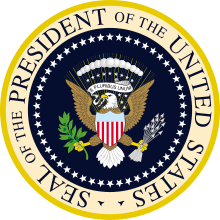 |
||
Thomas Woodrow Wilson (December 28, 1856 – February 3, 1924) was an American statesman and academic who served as the 28th President of the United States from 1913 to 1921. A member of the Democratic Party, Wilson served as the President of Princeton University from 1902 to 1910, and as Governor of New Jersey from 1911 to 1913, before winning the 1912 presidential election. As president, he oversaw the passage of progressive legislative policies unparalleled until the New Deal in 1933.[1] He also led the United States during World War I, establishing an activist foreign policy known as "Wilsonianism." He was one of the three key leaders at the 1919 Paris Peace Conference, where he championed a new League of Nations, but he was unable to win Senate approval for U.S. participation in the League.
Born in Staunton, Virginia, to a slaveholding family, Wilson spent his early years in Augusta, Georgia, and Columbia, South Carolina. His father was a leading Southern Presbyterian and helped to found the Presbyterian Church in the Confederate States of America. After earning a Ph.D. in political science from Johns Hopkins University, Wilson taught at various schools before taking a position at Princeton. In 1910, Democratic leaders recruited him to run for Governor of New Jersey. Serving from 1911 to 1913, Wilson broke with party bosses and won the passage of several progressive reforms. Wilson's success in New Jersey gave him a national reputation as a progressive reformer, and his Southern roots helped him win favor in that region. After several ballots, the 1912 Democratic National Convention selected Wilson as the party's presidential nominee. Theodore Roosevelt's third-party candidacy split the Republican Party, which re-nominated incumbent President William Howard Taft. Wilson won the 1912 election with a plurality of the popular vote and a large majority in the Electoral College.
Upon taking office, Wilson called a special session of Congress, whose work culminated in the Revenue Act of 1913, introducing a federal income tax which provided revenue lost when tariffs were sharply lowered. He also presided over the passage of the Federal Reserve Act, which created a central banking system in the form of the Federal Reserve System. Other major elements of Wilson's New Freedom agenda included the Federal Trade Commission Act, the Clayton Antitrust Act, and the Adamson Act, all of which established new economic regulations enforced by the federal government. Wilson staffed his cabinet and administration with numerous Southern Democrats; they insisted on racial segregation at the Treasury Department and other federal offices. Upon the outbreak of World War I in 1914, Wilson maintained a policy of neutrality between the Allied Powers and the Central Powers. In the presidential election of 1916, Wilson defeated Republican Charles Evans Hughes by a narrow margin, and Democrats retained control of Congress. His policy in dealing with the Mexican Revolution involved military actions, but stopped short of war.
In early 1917, Germany resumed unrestricted submarine warfare against American merchant ships, and in the Zimmermann Telegram proposed that Mexico form an alliance with Germany against the U.S in the event of American entry into World War I. In April, Wilson asked Congress to declare war in order to make "the world safe for democracy." The United States provided food, raw materials, and loans, and by mid-1918 was sending a newly raised army to Europe at the rate of 10,000 soldiers per day. Wilson focused on diplomacy and financial considerations, leaving military strategy to the generals, especially General John J. Pershing. On the home front, he raised income taxes, borrowed billions of dollars through the public's purchase of Liberty Bonds, and initiated a draft. He promoted labor union cooperation, regulated agriculture and food production through the Lever Act, and took direct control of the nation's railroad system. Wilson asked Congress for what became the Espionage Act of 1917 and the Sedition Act of 1918, suppressing anti-draft activists. The crackdown was intensified by his Attorney General A. Mitchell Palmer to include expulsion of non-citizen radicals during the First Red Scare of 1919–1920.
Early in 1918, Wilson issued his principles for an end to the war, the Fourteen Points. Following the signing of an armistice in November 1918, he traveled to Paris, concluding the Treaty of Versailles. Wilson embarked on a nationwide tour of the United States to campaign for ratification of the treaty and U.S. entrance into the League of Nations, but he suffered a severe stroke in October 1919. In his final year in office, Wilson secluded himself in the White House, disability having diminished his power and influence. The Treaty of Versailles was rejected by the Senate, and the U.S. remained outside of the League of Nations. Wilson retired from public office in 1921, and he died in 1924. Scholars and historians generally rank Wilson as one of the best U.S. presidents.[2]
Early life
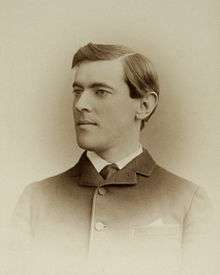
Wilson was born to a Scots-Irish family in Staunton, Virginia, on December 28, 1856, at 18–24 North Coalter Street (now the Woodrow Wilson Presidential Library).[3] He was the third of four children of Joseph Ruggles Wilson and Jessie Janet Woodrow.[4] Wilson's paternal grandparents immigrated to the United States from Strabane, County Tyrone, Ireland (present-day Northern Ireland), in 1807. His mother was born in Carlisle, England, the daughter of Rev. Dr. Thomas Woodrow from Paisley, Scotland, and Marion Williamson from Glasgow.[5]
Wilson's immigrant grandparents had settled in Steubenville, Ohio. There his father grew up and published a pro-tariff and anti-slavery newspaper, The Western Herald and Gazette.[6]
After marrying, Joseph and Jessie Wilson moved to the Southern United States in 1851 and came to fully identify with it, moving from Virginia deeper into the region as Wilson became a minister in Georgia and South Carolina. Joseph Wilson owned slaves, defended slavery, and also set up a Sunday school for his slaves. Both parents identified with the Confederacy during the American Civil War; they cared for wounded soldiers at their church, and Wilson's father briefly served as a chaplain in the Confederate Army.[4]:17 Woodrow Wilson's earliest memory, from the age of three, was of hearing that Abraham Lincoln had been elected and that a war was coming. Wilson would forever recall standing for a moment at General Robert E. Lee's side and looking up into his face.[7]
In 1861 Wilson's father was one of the founders of the Southern Presbyterian Church in the United States (PCUS) after it split from the northern Presbyterians. He served as the first permanent clerk of the Southern Church's General Assembly, was Stated Clerk for more than three decades from 1865 to 1898, and was Moderator of the PCUS General Assembly in 1879. He became minister of the First Presbyterian Church in Augusta, Georgia, and the family lived there until 1870, when Wilson was 14.[8][8] Wilson in 1873 became a communicant member of the Columbia First Presbyterian Church in South Carolina and remained a member throughout his life.[9]
Education
Wilson began reading at age ten; the delayed start was possibly caused by dyslexia. He later blamed the lack of schools. As a teen, he taught himself the Graham shorthand system to compensate, and achieved academically with self-discipline, studying at home with his father, then in classes at a small Augusta, Georgia school.[10] During Reconstruction, Wilson lived in Columbia, South Carolina, from 1870 to 1874, while his father was a theology professor at the Columbia Theological Seminary.[11]
His father moved the family to Wilmington, North Carolina, in 1874 where he was the minister at First Presbyterian Church until 1882. Wilson attended Davidson College in North Carolina for the 1873–74 school year, cut short by illness, then transferred as a freshman to the College of New Jersey (now Princeton University). He graduated in 1879, a member of Phi Kappa Psi fraternity. In his second year, he studied political philosophy and history, was active in the Whig literary and debating society, and wrote for the Nassau Literary Review.[12] He organized the Liberal Debating Society[13] and later coached the Whig–Clio Debate Panel.[14] In the hotly contested presidential election of 1876, Wilson declared his support for the Democratic Party and its nominee, Samuel J. Tilden.[15]
In 1879, Wilson attended the University of Virginia School of Law for one year; he was involved in the Virginia Glee Club and was president of the Jefferson Literary and Debating Society. While there, he enjoyed frequent trips to his birthplace of Staunton. He visited with cousins, and fell in love with one, Hattie Woodrow, though his affections were unrequited.[16]
When his health became frail and dictated his withdrawal from studies, he went home to his parents, then living in Wilmington, North Carolina, where he continued his law studies.[17] Wilson was admitted to the Georgia bar and made a brief attempt at law practice in January 1882; he found legal history and substantive jurisprudence interesting, but abhorred the day-to-day procedural aspects. After less than a year, he abandoned the practice to pursue his study of political science and history. Both parents expressed concern over a potentially premature decision.[18]
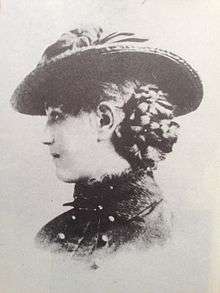
In the fall of 1883, Wilson entered Johns Hopkins University, a new graduate university modeled after German universities. He studied history, political science and the German language.[19] He also studied economics under professor Richard T. Ely.[20][21] Three years later, he completed his doctoral dissertation, Congressional Government: A Study in American Politics,[22] and received a Ph.D.[23]
Marriage and family
In late spring of 1883, Wilson was summoned to Rome, Georgia, to assist in the settlement of his maternal uncle William's estate, which was being mishandled by a brother-in-law. While there he met and fell in love with Ellen Louise Axson, the daughter of a minister from Savannah, Georgia; he proposed to her and they became engaged in Asheville.[24]
Wilson's marriage to Ellen was delayed by traumatic developments in her family; in late 1883, Ellen's father Edward, suffering from depression, was admitted to the Georgia State Mental Hospital, where in 1884 he committed suicide. After closing the family home in Rome, Georgia, and recovering from the initial shock, Ellen gained admission to the Art Students League of New York. After graduation, she pursued portrait art and received a medal for one of her works from the Paris International Exposition. She happily agreed to sacrifice further independent artistic pursuits in order to keep her marriage commitment, and in 1885 she and Wilson married.[25]
Personal interests
Wilson was an automobile enthusiast and, while President, he took daily rides in his favorite car, a 1919 Pierce-Arrow.[26] His enjoyment of motoring made him an advocate of funding for public highways.[27] He was also an avid baseball fan, and in 1915 became the first sitting president to attend and throw out the first ball at a World Series game. Wilson had been a center fielder during his Davidson College days and was the Princeton team's assistant manager.[28] Also, he cycled regularly, taking several cycling vacations in the English Lake District.[29] Wilson later took up golf.[30]
Academic career
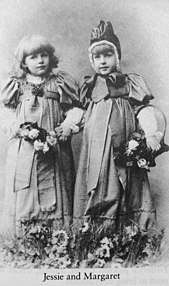

Wilson worked as a lecturer at Cornell University in 1886–87, where he joined the Irving Literary Society. He next taught at Bryn Mawr College from 1885 until 1888, teaching ancient Greek and Roman history; while there, he refused offers from the universities of Michigan and Indiana.[31] When Ellen was pregnant with their first child in 1886, the couple decided that Ellen should go to her Aunt Louisa Brown's residence in Gainesville, Georgia, to have their first child; she arrived just one day before the baby, Margaret, was born in April 1886. Their second child, Jessie, was born in August 1887.[32]
In 1888, Wilson left Bryn Mawr for Wesleyan University; it was a controversial move, as he had signed a three-year contract with Bryn Mawr in 1887. Both parties claimed contract violations and the matter subsided.[33] At Wesleyan, he was inducted into Phi Beta Kappa[34] and coached the football team and founded the debate team, which bears his name.[35]
In February 1890, with the help of friends, Wilson was elected by the Princeton University Board of Trustees to the Chair of Jurisprudence and Political Economy, at an annual salary of $3,000 (equivalent to $81,711 in 2017).[36] He continued a previous practice of reserving time for a six-week course in administration at Johns Hopkins.[37] He was also a faculty member of the short-lived coordinate college, Evelyn College for Women. Additionally, Wilson became the first lecturer of Constitutional Law at New York Law School, where he taught with Charles Evans Hughes.[38] Representing the American Whig Society, Wilson delivered an oration at Princeton's sesquicentennial celebration (1896) titled "Princeton in the Nation's Service," which was the origin for the school's motto.[39] Wilson became annoyed that Princeton was not living up to its potential, complaining, "There's a little college down in Kentucky which in 60 years has graduated more men who have acquired prominence and fame than has Princeton in her 150 years."[40]
Political science author
U.S. and British system contrast
Wilson, a disciple of Walter Bagehot, considered the United States Constitution to be cumbersome and open to corruption. Wilson favored a parliamentary system for the United States and in the early 1880s wrote, "I ask you to put this question to yourselves, should we not draw the Executive and Legislature closer together? Should we not, on the one hand, give the individual leaders of opinion in Congress a better chance to have an intimate party in determining who should be president, and the president, on the other hand, a better chance to approve himself a statesman, and his advisers capable men of affairs, in the guidance of Congress."[41]
Wilson's first political work, Congressional Government (1885), advocated a parliamentary system. He critically described the United States government, with frequent negative comparisons to Westminster. Critics contended the book was written without the benefit of the author observing any operational aspect of the U.S. Congress, and supporters asserted the work was the product of the imagination of a future statesman. The book reflected the greater power of the legislature, relative to the executive, during the post-bellum period.[42] Wilson later became a regular contributor to Political Science Quarterly, an academic journal.[43]
Wilson's second publication in 1890 was a textbook, entitled The State, used widely in college courses throughout the country until the 1920s. He argued that government should not be deemed evil and advocated the use of government to allay social ills and advance society's welfare.[44] in 1889 Wilson contributed to a U.S. historical series, covering the period from President Andrew Jackson through Reconstruction. His third book, entitled Division and Reunion, was published in 1893 and considered an outstanding contribution to American historical writing.[45] Wilson's fourth publication, a five-volume work entitled History of the American People, was the culmination of a series of articles written for Harper's, and was published in 1902.[46] In 1899, Wilson wrote in "The State" that governments could legitimately promote the general welfare "by forbidding child labor, by supervising the sanitary conditions of factories, by limiting the employment of women in occupations hurtful to their health, by instituting official tests of the purity or the quality of goods sold, by limiting the hours of labor in certain trades, [and] by a hundred and one limitations of the power of unscrupulous or heartless men to out-do the scrupulous and merciful in trade or industry."[47]
Wilson believed that America's system of checks and balances complicated American governance. If government behaved badly, Wilson queried, "How is the schoolmaster, the nation, to know which boy needs the whipping?"[48] Wilson singled out the United States House of Representatives for particular criticism, saying,
divided up, as it were, into forty-seven seignories, in each of which a Standing Committee is the court-baron and its chairman lord-proprietor. These petty barons, some of them not a little powerful, but none of them within reach [of] the full powers of rule, may at will exercise an almost despotic sway within their own shires, and may sometimes threaten to convulse even the realm itself.[49]
In his last scholarly work, Constitutional Government of the United States (1908), Wilson said that the presidency "will be as big as and as influential as the man who occupies it." By the time of his presidency, Wilson hoped that presidents could be party leaders in the same way British prime ministers were. Wilson also hoped that the parties could be reorganized along ideological, not geographic, lines. He wrote, "Eight words contain the sum of the present degradation of our political parties: No leaders, no principles; no principles, no parties."[50]
Wilson also wrote that charity efforts should be removed from the private domain and "made the imperative legal duty of the whole," a position which, according to Robert M. Saunders, seemed to indicate that Wilson "was laying the groundwork for the modern welfare state."[51] On the road to becoming governor of New Jersey, Wilson professed his "hearty support" for "reasonable" working hours, accident insurance, and just wages.[52] While serving as governor of New Jersey, Wilson vocally supported measures for the benefit of labor such as employers' liability, tenement-house legislation, and factory laws.[53]
Public administration
Wilson also studied public administration, which he called "government in action; it is the executive, the operative, the most visible side of government, and is of course as old as government itself".[54] He believed that the study of public administration could enable officials to increase governmental efficiency.[55] He faulted political leaders who focused on philosophical issues and the nature of government and dismissed the critical issues of government administration as mere "practical detail". He thought such attitudes represented the requirements of smaller countries and populations. By his day, he thought, "it is getting to be harder to run a constitution than to frame one."[56] He thought it time "to straighten the paths of government, to make its business less unbusinesslike, to strengthen and purify its organization, and it to crown its dutifulness".[57] He summarized the growth of such foreign states as Prussia, France, and England, highlighting the events that led to advances in administration.
By contrast, he thought the United States required greater compromise because of the diversity of public opinion and the difficulty of forming a majority opinion; thus practical reform of the government was necessarily slow. Yet Wilson insisted that "administration lies outside the proper sphere of politics"[58] and that "general laws which direct these things to be done are as obviously outside of and above administration."[59] He likened administration to a machine that functions independent of the changing mood of its leaders. Such a line of demarcation is intended to focus responsibility for actions taken on the people or persons in charge. As Wilson put it, "public attention must be easily directed, in each case of good or bad administration, to just the man deserving of praise or blame. There is no danger in power, if only it be not irresponsible. If it be divided, dealt out in share to many, it is obscured".[60] Essentially, he contended that the items under the discretion of administration must be limited in scope, as to not block, nullify, obfuscate, or modify the implementation of governmental decree made by the executive branch.
President of Princeton University
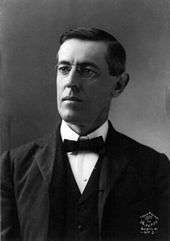
Wilson had in the past been offered the presidency at the University of Illinois in 1892, and at the University of Virginia in 1901, both of which he declined. The Princeton trustees promoted Professor Wilson to president in June 1902, replacing Francis Landey Patton, whom the trustees perceived to be an inefficient administrator.[61]
Although the school's endowment was barely $4 million, Wilson sought $2 million for a preceptorial system of teaching, $1 million for a school of science, and nearly $3 million for new buildings and salary increases. As a long-term objective, Wilson sought $3 million for a graduate school and $2.5 million for schools of jurisprudence and electrical engineering, as well as a museum of natural history.[62] He increased the faculty from 112 to 174, most of whom he selected himself on the basis of their records as outstanding teachers. The curriculum guidelines he developed proved important progressive innovations in the field of higher education.[63] Wilson also made biblical studies a scholarly pursuit, appointed the first Jew and the first Roman Catholic to the faculty, and helped liberate the board from domination by conservative Presbyterians.[64]
To emphasize the development of expertise, Wilson instituted academic departments and a system of core requirements. Students were to meet for these in groups of six with preceptors, followed by two years of concentration in a selected major. He tried to raise admission standards and to replace the "gentleman's C" with serious study. Wilson aspired, as he told alumni, "to transform thoughtless boys performing tasks into thinking men".[65]
In 1906 Wilson awoke to find himself blind in the left eye, the result of a blood clot and hypertension. Modern medical opinion surmises Wilson had suffered a stroke—he later was diagnosed, as his father had been, with hardening of the arteries. He took a vacation in Bermuda to convalesce. He began to exhibit his father's traits of impatience and intolerance, which would on occasion lead to errors of judgment.[66] In 1896 Wilson had, somewhat prophetically, described his problem, in the sesquicentennial speech at Princeton: "your thorough Presbyterian is not subject to the ordinary laws of life, is of too stubborn a fiber, too unrelaxing a purpose, to suffer mere inconvenience to bring defeat".[64]
When Wilson began vacationing in Bermuda in 1906, he met a socialite, Mary Hulbert Peck. Their visits together became a regular occurrence on his return. Wilson in his letters home to Ellen openly related these gatherings as well his other social events. According to biographer August Heckscher, Ellen could sense a problem. It became the topic of frank discussion between them. Wilson historians have not conclusively established there was an affair; but Wilson did on one occasion write a musing in shorthand—on the reverse side of a draft for an editorial: "my precious one, my beloved Mary."[67] Wilson also sent very personal letters to her which would later be used against him by his adversaries.[68]
During his time at Princeton, he attempted to curtail the influence of social elites by abolishing the upper-class eating clubs. He proposed moving the students into colleges, also known as quadrangles. Wilson's Quad Plan was met with fierce opposition from Princeton's alumni. Wilson persisted, saying that giving in "would be to temporize with evil".[69] In October 1907, due to the intensity of alumni opposition, the Board of Trustees withdrew its support for the Quad Plan and instructed Wilson to withdraw it.[70] Not long afterward, Wilson suffered a recurrence of his 1906 ailment; as before, a vacation was prescribed and proved beneficial.[71]
Late in his tenure, Wilson had a confrontation with Andrew Fleming West, dean of the graduate school, and also West's ally ex-President Grover Cleveland, who was a trustee. Wilson wanted to integrate a proposed graduate school building into the campus core, while West preferred a more distant campus site. 1909, Wilson's final year at Princeton, began with a gift made to the graduate school campaign subject to the graduate school being located off campus; the acceptance of this condition by the board was a pivotal defeat for Wilson.[72] The national press covered the confrontation as a battle between the elites, represented by West, versus the populists, represented by Wilson.
From its outset, Wilson became disenchanted with resistance to his recommendations at Princeton; he ruminated on future political leadership. Prior to the Democratic presidential nominating convention in 1908, Wilson had dropped hints to some influential players in the Democratic Party of his interest in the ticket. While he had no real expectations of being placed on the ticket, he did leave instructions that he should not be offered the vice presidential nomination. He then left for a vacation in Scotland. Party regulars considered his ideas politically as well as geographically detached and fanciful, but the seeds had been sown.[73] Wilson later commented that politics was less brusque than university administration.[74]
Wilson was elected president of the American Political Science Association in 1910, but soon decided to leave his Princeton post and enter New Jersey state politics.[75] McGeorge Bundy in 1956 described Wilson's contribution to Princeton: "Wilson was right in his conviction that Princeton must be more than a wonderfully pleasant and decent home for nice young men; it has been more ever since his time".[76]
Governor of New Jersey
In January 1910, Wilson had drawn the attention of New Jersey's former U.S. Senator James Smith, Jr. and George Harvey as the potential Democratic standard bearer in the upcoming gubernatorial election. On July 12, 1910 he was introduced to New Jersey's power players at the Lawyers Club in New York, including James Richard Nugent, Robert S. Hudspeth, Millard F. Ross, and Richard V. Lindabury. The bosses had chosen their man, but his nomination was not a given—many, including organized labor, felt Wilson was an inexperienced newcomer.[77] Nevertheless, the bosses marshaled their forces at the party convention, and on September 14 Wilson was nominated, despite his endorsement of the local option on the liquor issue in opposition to his political machine. He submitted his letter of resignation to Princeton on October 20.[78]
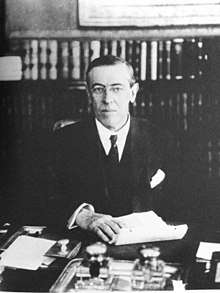
Wilson's opponent in the general election was the Republican candidate Vivian M. Lewis, the State Commissioner of Banking and Insurance. Wilson's campaign focused on his promise to be independent of party bosses. Wilson quickly shed his professorial style for more emboldened speechmaking and presented himself as a full-fledged progressive.[79] He soundly defeated Lewis by a margin of more than 650,000 votes, although Republican William Howard Taft had carried New Jersey in the 1908 presidential election by more than 82,000 votes.[80][81] Historian Edmund Morris called Wilson a "dark horse" in the Governor's race. He attributed the success of Wilson and others against the Taft Republicans in 1910 in part to the emergent national progressive message enunciated by Theodore Roosevelt after his presidency.[82]
In the 1910 election, the Democrats also took control of the General Assembly, though the State Senate remained in Republican hands. Wilson appointed Joseph Patrick Tumulty as his private secretary, a position he held throughout Wilson's political career.[83] Wilson began formulating his reformist agenda, intending to ignore the demands of his party machinery. After Wilson's election, political boss (and former U.S. Senator) Smith asked Wilson to endorse his own reelection bid in the state legislature (this was before popular election of senators); Wilson refused and instead endorsed Smith's opponent James Edgar Martine, who had won the primary. When Martine won the seat, Wilson had positioned himself as a new force in the party in the state.[84]
Wilson concentrated on four major state reforms: changes in the election laws, a corrupt practices act, Workmen's Compensation, and establishment of a commission to regulate utilities. The Geran bill, drafted by Elmer H. Geran, expanded public participation in primaries for all offices including party officials and delegates; it was thus directed at the power of the political bosses. It passed the state assembly, albeit by a narrow margin. The corrupt practices law and Workmen's Compensation statute soon followed.[85]
A number of other reforms were realized during the remainder of Wilson's term as governor. Free dental clinics were established, a "comprehensive and scientific" poor law was enacted, and the usage of common drinking cups was prohibited. Trained nursing was also standardized, while contract labor in all reformatories and prisons was abolished, an indeterminate sentence act was passed, and regulation of weights and measures was carried out.[86] A law was introduced that compelled all railroad companies "to pay their employees twice monthly," while regulation of the working hours, health, safety, employment, and age of people employed in mercantile establishments was carried out. Contract labor in penal institutions was abolished. In addition, a law was passed extending the civil service "to employees of the State, counties, and municipalities,"[87] labor by women and children was limited, and oversight of factory working conditions was strengthened.[88] A new State Board of Education was also set up "with the power to conduct inspections and enforce standards, regulate districts' borrowing authority, and require special classes for students with handicaps."[89]
Presidential election of 1912
Democratic nomination
Wilson's was prominent as a governor and in the national media. In March 1911, Wilson committed himself to try for the Democratic nomination for President when he spoke at an Atlanta meeting of the Southern Commercial Congress; afterwards he said : "I was given a dinner, breakfast and reception, and on every possible occasion was nominated for the presidency!"[90] While Wilson was in Atlanta, his wife Ellen alerted him that key Democrat William Jennings Bryan was visiting Princeton, and recalling Wilson's opposition to him in 1896, invited him for dinner upon Wilson's return. The establishment of rapport with Bryan, the most recent standard-bearer of the party, was a success.[91]
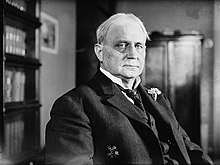
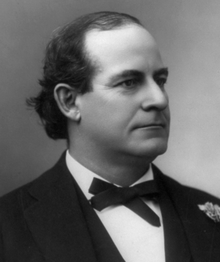
Wilson began a public campaign for the nomination in the South, with a speech to the Pewter Platter Club in Norfolk, Virginia. While he was received enthusiastically, the speech, reformist in nature, was considered provocative and radical by the conservative audience, making the visit on the whole less than positive.[92] However, as Wilson was the first Southerner to have a serious chance at the White House since 1848, Southern Democrats in general strongly supported Wilson's campaign for the nomination.[93] More of Wilson's support came from young progressives in that region, including intellectuals, editors and lawyers. Wilson managed to maneuver through the complexities of local politics. For example, in Tennessee the Democratic Party was divided over Prohibition; Wilson was progressive and sober, but not dry, and appealed to both sides. They united behind him to win the presidential election in the state, but divided over state politics and lost the gubernatorial election.[94]
After Norfolk, Wilson then proceeded westward to Kansas, Colorado, California, Oregon and Washington; he favored voting reforms which empowered the populace, such as the initiative, the referendum and the recall (excepting judges).[95] In California Wilson was asked about his views on women's suffrage and though he was firmly opposed, he evasively said that it was a matter for the states to decide.[96]
In July 1911 Wilson brought William Gibbs McAdoo and Edward Mandell House in to manage the campaign.[97] The 1912 Democratic convention in Baltimore was one of the most dramatic conventions in American history; only the Republican conventions of 1880 and 1940, and the Democratic convention of 1952 are comparable.[98] William F. McCombs, who helped Wilson win the governorship, served as convention chairman. The Republicans had set the stage a week earlier at their convention, nominating incumbent William Howard Taft, with Theodore Roosevelt leaving to launch an independent campaign which would split the party vote.[99] Wilson was convinced that the Baltimore convention should be allowed to work its will without his interference—so he went golfing and motoring. His assistant Tumulty "nearly collapsed" under the strain.[100]
The convention deadlocked for over forty ballots—no candidate could reach the two-thirds vote required. The leading contender was House Speaker Champ Clark, a prominent progressive, strongest in the border states. Other less charismatic contenders were Governor Judson Harmon of Ohio, and Representative Oscar Underwood of Alabama. Publisher William Randolph Hearst, a leader of the left wing of the party, supported Clark. William Jennings Bryan, the nominee in 1896, 1900 and 1908, played a critical role in his declared opposition to any candidate supported by "the financiers of Wall Street". On the tenth ballot, New York's delegation went unanimously to Clark, and the battle lines were clearly drawn between the bosses and the rank and file delegates.[101] Bryan then announced on the fourteenth ballot that his vote for Clark would be withheld due to the New York vote. Wilson's tally began to climb steadily, and he initially topped Clark's vote on the thirtieth ballot.[102] Bryan announced for Wilson, who ultimately won the nomination on the 46th ballot.[103] Wilson chose Indiana Governor Thomas R. Marshall as his running mate.[104]
General election
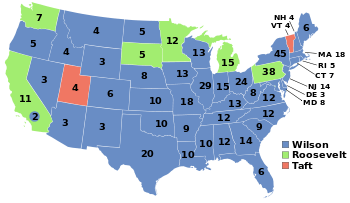
Wilson directed Chairman of Finance Henry Morgenthau not to accept contributions from corporations and to prioritize smaller donations from the widest possible quarters of the public, and Morgenthau did this. In order to further embolden Democrats, especially in New Jersey and New York, Wilson set out to ensure the defeat of local incumbent candidates supported by political machines: James Smith Jr. (U.S. Senate in New Jersey) and John Dix (Governor of New York). He succeeded in both of these efforts and thereby weakened arguments that party control resided with political bosses.[105]
The pattern of Wilson's speechmaking was exemplified by his performances in Buffalo and New York City. His oratory style was, "right out of my mind as it is working at the time". He maintained towards his primary opponent Roosevelt a tone of humorous detachment, describing the Bull Moose party as "the irregular Republicans, the variegated Republicans". Wilson shunned the stump speech campaign routine, and initially was reluctant to conduct an extensive campaign tour, but this changed after Roosevelt went on the offensive.[106]
A notably progressive speech in Minneapolis included the following: "that property as compared with humanity, as compared with the vital red blood in the American people, must take second place, not first place".[107] For advice on economic policy, Wilson frequently sought out Louis D. Brandeis, who promoted the concept that corporate trusts be regulated by the government. His campaign increased its focus upon the elimination of monopoly in all forms. Wilson also concluded that major reforms in banking and a lower tariff were needed to eliminate the spheres of entrenched interests which distorted the functioning of the free market.[108] In Indianapolis he said that for the next president, "there will be no greater burden in our generation than to organize the forces of liberty… And to make conquest of a new freedom for America". This comment inspired the title of Wilson's policy of "New Freedom", emphasizing lower tariffs and limited federal government, albeit with increased anti-trust law enforcement and creation of a new banking regulator, the Federal Reserve System.[109] During the election campaign, Wilson also asserted that it was the task of government "to make those adjustments of life which will put every man in a position to claim his normal rights as a living, human being."[110]
When Roosevelt was wounded by an assassin, Wilson restricted his events to those already scheduled and limited his criticism to the regular Republicans. It was evident by this time that the Wilson movement would not be checked.[111] The GOP split between Taft and Roosevelt enlarged Wilson's success in the electoral college. Wilson appealed to African Americans and promised to work for them, gaining some support among them in the North at the expense of the Republicans. But throughout the South, most African Americans had been disenfranchised by actions of state legislatures from 1890 to 1908, and were largely excluded from the political system.[112][113] Wilson took 42% of the popular vote and won 435 electoral votes from 40 states.[114] It is not clear if Roosevelt took more votes from fellow Republican Taft, or fellow progressive Wilson.[115]
Presidency (1913–1921)
First term (1913–1917)
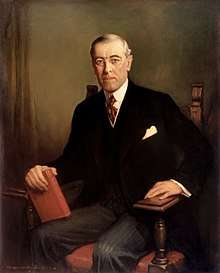
After a vacation in Bermuda, Wilson was energized and more aggressive, even combative. He noted the presidency was an office "in which a man must put on his war paint". In Chicago, he addressed the Commercial Club, including some of the most powerful industrial and financial leaders of the Midwest; he emphasized his progressivism and called his audience to account for their malpractices in business affairs.[116]
In his inaugural address Wilson reiterated his agenda for lower tariffs and banking reform, as well as aggressive trust and labor legislation. The Wilsons decided against an inaugural ball and instead gathered with family and friends at the White House.[117] As the first Southerner elected to the presidency since 1848, Wilson inspired celebrations in the capital.[118]
Wilson's demand for private reflection was evident when he immediately announced that office seekers were not permitted to visit the White House. His decision-making style was to use solitude in conjunction with prevailing opinions in making decisions.[119] Wilson's personal staff reflected his preferences; Tumulty's position provided a political buffer and intermediary with the press, and his irrepressible spirits offset the president's often dour disposition.[120] Another close member of Wilson's personal staff was his physician, Navy medical officer Cary T. Grayson. He became familiar with the president's medical history and confirmed his circulatory problem and hardening of the arteries.[121]
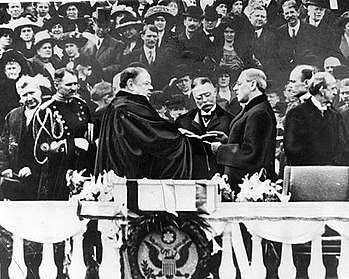
Wilson pioneered twice-weekly press conferences in the White House. Though they were modestly effective, the president prohibited his being quoted and was particularly indeterminate in his statements.[122] The first such press conference was on March 15, 1913, when reporters were allowed to ask him questions.[123] In 1913, he became the first president to deliver the State of the Union address in person since 1801, as Thomas Jefferson had discontinued this practice.
Wilson was the first Democrat other than Grover Cleveland to be elected president since 1856,[118] and he recognized his party's need for high-level federal patronage.[124] He worked closely with Southern Democrats. In Wilson's first month in office, Postmaster General Albert S. Burleson brought up the issue of racially segregating workplaces in a cabinet meeting[125] and urged the president to establish this policy across the government, in restrooms, cafeterias and work spaces. Treasury Secretary William G. McAdoo also permitted lower-level officials to racially segregate employees in the workplaces of those departments. By the end of 1913 many departments, including the Navy, had workspaces segregated by screens. Restrooms and cafeterias were also segregated, although no executive order had been issued.[125] Segregation was urged by conservative groups, such as the Fair Play Association.[125]
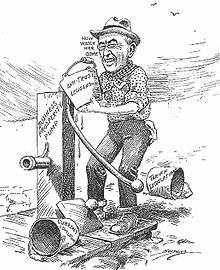
Wilson defended his administration's segregation policy in a July 1913 letter responding to Oswald Garrison Villard, publisher of the New York Evening Post and founding member of the National Association for the Advancement of Colored People (NAACP); Wilson suggested that segregation removed "friction" between the races.[125] Ross Kennedy says that Wilson complied with predominant public opinion,[126] but his change in federal practices was protested in letters from both blacks and whites to the White House, mass meetings, newspaper campaigns and official statements by both black and white church groups.[125] The president's African-American supporters, who had crossed party lines to vote for him, were bitterly disappointed, and they and Northern leaders protested the changes.[125] Wilson continued to defend his policy, as in a letter to "prominent black minister Rev. H.A. Bridgman, editor of the Congregation and Christian World."[125] Heckscher argues that Wilson had promised African Americans to deal generously with racial injustices, but did not deliver on these assurances.[127] Segregation in government offices and discriminatory hiring practices had been institutionalised by President Theodore Roosevelt and continued by President Taft; the Wilson administration continued and escalated these practices.[128]
In an early foreign policy matter, Wilson responded to an angry protest by the Japanese government when the state of California proposed legislation that excluded Japanese people from land ownership in the state.[129] Japan's sense of humiliation remained high for decades to come.[130]
In implementing economic policy, Wilson had to transcend the sharply opposing policy views of the Southern and agrarian wing of the Democratic Party led by Bryan, and the pro-business Northern wing led by urban political bosses.[131] In his Columbia University lectures of 1907, Wilson had said "the whole art of statesmanship is the art of bringing the several parts of government into effective cooperation for the accomplishment of particular common objects".[131] As he took up the first item of his "New Freedom" agenda—lowering the tariffs—he quite adroitly applied this artistry. With large Democratic majorities in Congress and a healthy economy, Wilson seized the opportunity to achieve his agenda.[132] Wilson also made quick work of realizing his pledges to beef up antitrust regulation and to bring reform to banking and currency matters.[133]
Tariff legislation and income tax
To facilitate reduction of the tariffs, Wilson garnered unexpected support from a previous rival Oscar Underwood, Chairman of the House Ways and Means Committee, and Sen. Furnifold M. Simmons, Chairman of the Senate Finance Committee. In May 1913, the Underwood Tariff passed in the House by a vote of 274 to 5; it would take a bit longer passing in the Senate—in September—and was signed by Wilson three weeks later.[134] Its effects were soon overwhelmed by the changes in trade caused by World War I.[135] Wilson mobilized public opinion behind the tariff changes by denouncing corporate lobbyists in an address to Congress, and by staging an elaborate signing ceremony.[136] The revenue lost by the lower tariff was replaced by a new federal income tax, authorized by the 16th Amendment.
Federal Reserve System
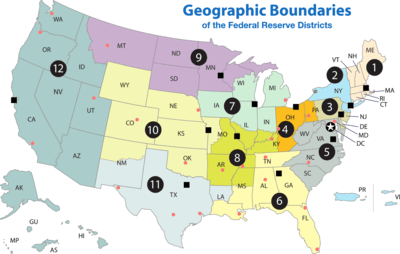
Wilson had not waited for completion of the tariff legislation to proceed with his next item of reform—banking—which he initiated in June 1913. After consulting with Brandeis, Wilson declared the banking system must be "public not private, must be vested in the government itself so that the banks must be the instruments, not the masters, of business."[137] He tried to find a middle ground between conservative Republicans, led by Senator Nelson W. Aldrich, and the powerful left wing of the Democratic party, led by William Jennings Bryan, who strenuously denounced private banks and Wall Street. The latter group wanted a government-owned central bank that could print paper money as Congress required. The compromise, based on the Aldrich Plan but sponsored by Democratic Congressmen Carter Glass and Robert Owen, allowed the private banks to control the 12 regional Federal Reserve Banks, but appeased the agrarians by placing controlling interest in the system in a central board appointed by the president with Senate approval. Moreover, Wilson convinced Bryan's supporters that because Federal Reserve notes were obligations of the government, the plan met their demands for an elastic currency. Having 12 regional banks, with designated geographic districts, was meant to weaken the influence of the powerful New York banks, a key demand of Bryan's allies in the South and West, and was a key factor in winning Glass' support.[138] The Federal Reserve Act passed in December 1913.[139]
Wilson named Paul Warburg and other prominent bankers to direct the new system. While power was supposed to be decentralized, the New York branch dominated the Fed as the "first among equals".[140] The new system began operations in 1915 and played a major role in financing the Allied and American war effort.[141] The strengthening of the Federal Reserve during the Great Depression was later a major accomplishment of Franklin D. Roosevelt's New Deal.[142]
At the end of 1913, summing up the president's efficacy, the Saturday Evening Post magazine stated, "This administration is Woodrow Wilson's and non-other's. He is the top, middle and bottom of it. There is not an atom of divided responsibility ... the Democratic Party revolves about him. He is the center of it—the biggest Democrat in the country—the leader and the chief".[143]
Antitrust and other measures
Wilson began pushing for legislation which culminated with the Federal Trade Commission Act signed in September 1914. In doing so, Wilson broke with his predecessors' practice of litigating the antitrust issue in the courts, known as trust-busting; the new Federal Trade Commission provided a new regulatory approach, to encourage competition and reduce perceived unfair trade practices. In addition, he pushed through Congress the Clayton Antitrust Act making certain business practices illegal, such as price discrimination, agreements prohibiting retailers from handling other companies' products, and directorates and agreements to control other companies. The power of this legislation was greater than that of previous anti-trust laws since it dictated accountability of individual corporate officers and clarified guidelines. This law was considered the "Magna Carta" of labor by Samuel Gompers because it ended union liability antitrust laws. In 1916, under threat of a national railroad strike, Wilson approved legislation that increased wages and cut working hours of railroad employees; there was no strike.[144]
In the summer of 1914 Wilson gained repeal of toll exemptions at the Panama Canal for American ships; this was received positively by the international community, as a cessation of past discrimination against foreign commerce. The measure was considered unpatriotic by U.S. business interests and opponents such as Tammany Hall.[145]
With the President reaching out to new constituencies, a series of programs was targeted at farmers. The Smith–Lever Act of 1914 created the modern system of agricultural extension agents sponsored by the state agricultural colleges. The agents taught new techniques to farmers. The 1916 Federal Farm Loan Act provided for issuance of low-cost long-term mortgages to farmers.[146]
Child labor was curtailed by the Keating–Owen Act of 1916, but the Supreme Court declared it unconstitutional in 1918.[147]
Mexican Revolution
Taft had supported the revolution that brought about the election of Francisco I. Madero as president of Mexico. Wilson, who took office shortly after Madero's assassination in 1913, rejected the legitimacy of Huerta's "government of butchers" and demanded Mexico hold democratic elections. Wilson's unprecedented approach meant no recognition and doomed Huerta's prospects. Wilsonian idealism was a reason for American intervention in Latin America until the 1920s and 1930s, when moralistic interventions were abandoned in favor of realism.[148] After Huerta arrested U.S. navy personnel in the port of Tampico Wilson sent his navy to occupy Veracruz. War between the United States and Mexico was averted through negotiations, and in 1916 his reelection campaign for president boasted he had "kept us out of war." Huerta fled Mexico and Carranza came to power.[149]
Pancho Villa
Though the administration had achieved the desired result, it was a pyrrhic victory, as Carranza's lieutenant, Pancho Villa, presented a more serious threat in 1916. In early 1916 Pancho Villa raided Columbus, New Mexico, killing eighteen Americans and causing an enormous nationwide demand for his punishment. Wilson ordered Gen. John Pershing and 4000 troops into northern Mexico to capture Villa, which they were unable to do even as Pershing continued his pursuit deep into Mexico. President Carranza then pivoted against the Americans and accused them of a punitive invasion. However, tensions subsided and bilateral negotiations began. The issue had become a possible cause for war with Germany, so Wilson ended Pershing's diversion in February 1917. In January, Germany's foreign minister sent Mexico the Zimmermann Telegram inviting it to join in war against the United States. Washington learned of the Zimmermann proposal on February 23 and détente with Mexico was essential. Wilson accorded Carranza diplomatic recognition in April, after Congress declared war on Germany. Biographer Arthur Link calls it Carranza's victory—his successful handling of the chaos inside Mexico, as well as over Wilson's policies. Mexico was now free to develop its revolution without American pressure.[150] Pershing became a national figure. Later, Wilson selected him to command the American forces being sent to fight in France.
Miners strike, wife's death and remarriage
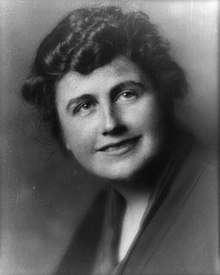
In a 1914 dispute between Colorado miners and their company, a confrontation resulted in the Ludlow Massacre—the deaths of eight strikers, eleven children and two mothers. Part owner John D. Rockefeller, Jr. refused Wilson's offer of mediation, conditioned upon collective bargaining, so Wilson sent in U.S. troops. While Wilson succeeded in bringing order to the situation, and demonstrated support for the labor union, the miners' unconditional surrender to the implacable owners was a defeat for Wilson.[151]
His wife Ellen's failing health, due to kidney failure, worsened in the spring of 1914; after a fall, she was bedridden, then rallied briefly, but Wilson wrote "my dear one… grows weaker and weaker, with a pathetic patience and sweetness." He was at her bedside to the end, which came August 6, when Wilson despairingly said "Oh my God, what am I to do." Wilson later wrote accurately of his mourning and depression, "Of course you know what has happened to me…God has stricken me almost beyond what I can bear". Six months of depression followed for him, though mourning continued. At the same time that Wilson's private world shattered, World War I broke out in Europe, and this momentously changed his political life.[152]
In January 1915, Wilson emerged from his depression during a spirited speech in Indianapolis where he said, "the trouble with the Republican Party is that it has not had a new idea for thirty years… the Republican Party is still a covert and a refuge for those who are afraid, for those who want to consult their grandfathers about everything."[153] Another sign of Wilson's emotional restoration was the aggressiveness with which he pursued passage of a ship-purchase bill to bulk up the inadequately equipped merchant marine. This lasted until March 1915, when he moderated, drew back from the bill and, without its passage, congratulated the Congress for its work in the session just ended—his initial journey through mourning was evident.[154]
On March 18, 1915, then-White House hostess Helen Woodrow Bones invited Edith Bolling Galt, who was a friend of hers, to tea at the White House, and there and then Galt met Wilson.[155][156] Galt was a widow and jeweler who was also a Southerner. After several meetings, Wilson fell in love with her, and in May, he proposed. Galt initially rebuffed him, but Wilson was undeterred and continued the courtship.[157] Edith gradually warmed to the relationship and they became secretly engaged in the fall of 1915.[158] Many in Wilson's camp had become concerned about the appearance of a premature romance so soon after the death of his wife. The engagement was not made public until October and they were married on December 18, 1915, after a formal year of mourning. Wilson was the third president to marry while in office. John Tyler had married in 1844 and Grover Cleveland in 1886.[159]
Events leading to U.S. entry into World War I (1914–16)
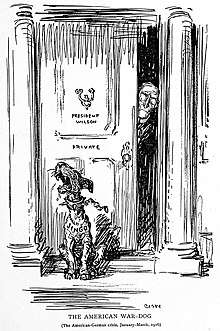
From 1914 until early 1917, Wilson's primary objective was to keep America out of the war in Europe, and his policy was, "the true spirit of neutrality, which is the spirit of impartiality and fairness and friendliness to all concerned."[160] The president insisted that all government actions be neutral, and that the belligerents must respect that neutrality according to the norms of international law. Wilson told the Senate in August 1914 when the war began that the United States, "must be impartial in thought as well as in action, must put a curb upon our sentiments as well as upon every transaction that might be construed as a preference of one party to the struggle before another." He was ambiguous whether he meant the United States as a nation or meant all Americans as individuals.[161] Wilson has been accused of violating his own rule of neutrality. Later that month he explained himself privately to his top foreign policy advisor Colonel House, who recalled the episode later:
- I was interested to hear him express as his opinion what I had written him some time ago in one of my letters, to the effect that if Germany won it would change the course of our civilization and make the United States a military nation. He also spoke of his deep regret, as indeed I did to him in that same letter, that it would check his policy for a better international ethical code. He felt deeply the destruction of Louvain [in Belgium], and I found him as unsympathetic with the German attitude as is the balance of America. He goes even further than I in his condemnation of Germany's part in this war, and almost allows his feeling to include the German people as a whole rather than the leaders alone. He said German philosophy was essentially selfish and lacking in spirituality. When I spoke of the Kaiser building up the German machine as a means of maintaining peace, he said, "What a foolish thing it was to create a powder magazine and risk someone's dropping a spark into it!" He thought the war would throw the world back three or four centuries. I did not agree with him. He was particularly scornful of Germany's disregard of treaty obligations, and was indignant at the German Chancellor's designation of the Belgian Treaty as being "only a scrap of paper" ... But although the personal feeling of the President was with the Allies, he insisted then and for many months after, that this ought not to affect his political attitude, which he intended should be one of strict neutrality. He felt that he owed it to the world to prevent the spreading of the conflagration, that he owed it to the country to save it from the horrors of war.[162]
Wilson made numerous offers to mediate and sent Colonel House on diplomatic missions; both sides politely dismissed these overtures. When Britain declared a blockade of neutral ships carrying contraband goods to Germany, Wilson mildly protested non-lethal British violations of neutral rights; the British knew that it would not be a casus belli for the United States.[163] In early 1915 Germany declared the waters around Great Britain to be a war zone; Wilson dispatched a note of protest, imposing "strict accountability" on Germany for the safety of neutral ships. The meaning of the policy, dubiously applied to specific incidents, evolved with the policy of neutrality, but ultimately formed the substance of U.S. responses over the next two years.[164]
The main crisis came when a German U-boat sank the British ocean liner RMS Lusitania in May 1915. International law required a warning so that passengers and crew could board life boats. No warning was issued and the ship sank in 18 minutes, with a thousand deaths including over 100 Americans. Wilson said, "There is such a thing as a man being too proud to fight. There is such a thing as a nation being so right that it does not need to convince others by force that it is right". Many reacted to these remarks with contempt.[165] Wilson protested to Berlin, but its reply was evasive. Secretary of State Bryan, strongly opposed to war, resigned and was replaced by Robert Lansing. The White Star liner SS Arabic was then torpedoed, with two American casualties. Wilson threatened a diplomatic break unless Germany repudiated the action; Germany then gave a written promise: "liners will not be sunk by our submarines". Wilson had won a promise that merchant ships would not be sunk without warning, and most importantly had kept the U.S. out of the war.[166] Meanwhile, Wilson requested and received funds in the final 1916 appropriations bill to provide for 500,000 troops. It also included a five-year Navy plan for major construction of battleships, cruisers, destroyers and submarines—showing Wilson's dedication to a big Navy.[167]
In March 1916 the SS Sussex, an unarmed ferry under the French flag, was torpedoed in the English Channel, and four Americans were counted among the dead; the Germans had flouted the post-Lusitania exchanges. The president demanded the Germans reject their submarine tactics.[168] Wilson drew praise when he succeeded in wringing from Germany a pledge to constrain their U-boat warfare to the rules of cruiser warfare. This was a clear departure from existing practices—a diplomatic concession from which Germany could only more brazenly withdraw, and regrettably did.[169]
Wilson made a plea for postwar world peace in May 1916; his speech recited the right of every nation to its sovereignty, territorial integrity and freedom from aggression. "So sincerely do we believe these things", Wilson said, "that I am sure that I speak the mind and wish of the people of America when I say that the United States is willing to become a partner in any feasible association of nations formed in order to realize these objectives". At home the speech was seen as a turning point in policy. In Europe the words were received by the British and the French without comment. His harshest European critics rightly thought the speech reflected indifference on Wilson's part; indeed, Wilson never wavered from a belief that the war was the result of corrupt European power politics.[170]
Wilson made his final offer to mediate peace on December 18, 1916. As a preliminary, he asked both sides to state their minimum terms necessary for future security. The Central Powers replied that victory was certain, and the Allies required the dismemberment of their enemies' empires; no desire for peace existed, and the offer lapsed.[171]
Presidential election of 1916
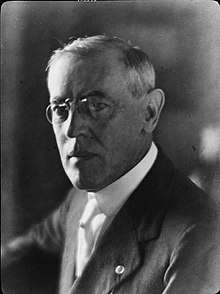
Wilson's remarriage rejuvenated his personal aspirations for re-election. Edith Wilson enjoyed, as Ellen never had, the crowds and the power as a close collaborator with her husband.[172] Executive decisions just prior to the campaign also enabled Wilson to bolster his political mastery. He was presented with a vacancy on the Supreme Court, which he succeeded in filling with a controversial nominee, Louis Brandeis, the first Jewish member of the court.[173] Also, in the summer of 1916 the nation's economy was endangered by a railroad strike. The president called the parties to a White House summit in August—after two days and no results, Wilson proceeded to settle the issue, using the maximum eight-hour work day as the linchpin. Once the Congress passed the Adamson bill incorporating the president's proposal, the strike was cancelled. Wilson was praised for averting a national economic disaster, though the law was received with howls from conservatives denouncing a sellout to the unions and a surrender by Congress to an imperious president.[174]
In the campaign, McCombs was replaced as chairman of the Democratic Party by Vance C. McCormick, a leading progressive, and Ambassador Henry Morgenthau was recalled from Turkey to manage campaign finances.[175] "Colonel" House played an important role in the campaign. "He planned its structure; set its tone; helped guide its finance; chose speakers, tactics, and strategy; and, not least, handled the campaign's greatest asset and greatest potential liability: its brilliant but temperamental candidate."[176]
Wilson, renominated without opposition, employed his campaign slogan "He kept us out of war", though he never promised unequivocally to stay out of the war. In his acceptance speech on September 2, 1916, Wilson pointedly warned Germany that submarine warfare resulting in American deaths would not be tolerated, saying "The nation that violates these essential rights must expect to be checked and called to account by direct challenge and resistance. It at once makes the quarrel in part our own."[177]
As the Party platform was drafted, Senator Owen of Oklahoma urged Wilson to take ideas from the Progressive Party platform of 1912 "as a means of attaching to our party progressive Republicans who are in sympathy with us in so large a degree." At Wilson's request, Owen highlighted federal legislation to promote workers' health and safety, prohibit child labour, provide unemployment compensation and establish minimum wages and maximum hours. Wilson, in turn, included in his draft platform a plank that called for all work performed by and for the federal government to provide a minimum wage, an eight-hour day and six-day workweek, health and safety measures, the prohibition of child labour, and (his own additions) safeguards for female workers and a retirement program.[178] Wilson was also noted for his support of social insurance, such as government pensions to poor mothers.[179]
Wilson's opponent was Republican Charles Evans Hughes, former governor of New York with a progressive record similar to Wilson's as governor of New Jersey. Theodore Roosevelt commented that the only thing different between Hughes and Wilson was a shave. However, Hughes had to try to hold together a coalition of conservative Taft supporters and progressive Roosevelt partisans, and his campaign never assumed a definite form. Wilson ran on his record and ignored Hughes, reserving his attacks for Roosevelt. When asked why he did not attack Hughes directly, Wilson told a friend, "Never murder a man who is committing suicide."[180]
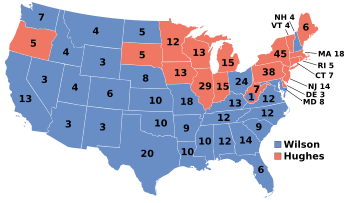
The election's outcome was in doubt for several days and was determined by several close states. Wilson won California by 3,773 of almost a million votes cast, and New Hampshire by 56 votes. Hughes won Minnesota by 393 votes out of over 358,000. In the final count, Wilson had 277 electoral votes vs. Hughes' 254. Wilson was able to win by picking up many votes that had gone to Teddy Roosevelt or Eugene V. Debs in 1912.[181] By the time Hughes' concession telegram arrived, Wilson commented "it was a little moth-eaten when it got here".[182]
In December 1916, a month after his reelection, Wilson addressed a conference on social insurance at which he spoke of the issue as "the dominant interest of our own time".[183] Wilson praised the conference as exemplifying "social understanding", which he identified as "one of the best elements of social insurance ... an interchange of views and a comprehension of interests which for a long time was only too rare".[183]
Second term (1917–1921)
Entry into World War I
Wilson objected to Britain's seizure of mail from neutral ships and its blacklisting of firms that did any business with Germany. Wilson insisted a league of nations was the solution to ending the war.[184] Wilson found it increasingly difficult to maintain neutrality, after Germany rescinded earlier promises—the Arabic pledge and the Sussex pledge. Early in 1917 the German ambassador Johann von Bernstorf informed the U.S. of Germany's commitment to unrestricted submarine warfare.[185] Then came the revelation of the Zimmermann Telegram, in which Germany attempted to enlist Mexico as a fighting ally.[186] Wilson's reaction after consulting the cabinet and the Congress was a minimal one—that diplomatic relations with the Germans be brought to a halt. The president said, "We are the sincere friends of the German people and earnestly desire to remain at peace with them. We shall not believe they are hostile to us unless or until we are obliged to believe it".[187] In March 1917 several American ships were sunk by Germany; the cabinet was unanimously in favor of war.[188]
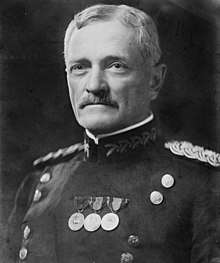
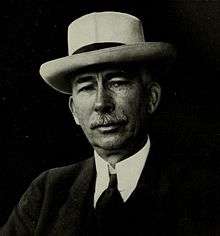
Wilson delivered his War Message to a special session of Congress on April 2, 1917, declaring that Germany's latest pronouncement had rendered his "armed neutrality" policy untenable and asking Congress to declare Germany's war stance was an act of war.[189] He proposed the United States enter the war to "vindicate principles of peace and justice in the life of the world as against selfish and autocratic power". The German government, Wilson said, "means to stir up enemies against us at our very doors". He then also warned that "if there should be disloyalty, it will be dealt with a firm hand of repression."[190] Wilson closed with:
Our object ... is to vindicate the principles of peace and justice in the life of the world as against selfish and autocratic power ... We are glad ... to fight ... for the ultimate peace of the world and for the liberation of its peoples, the German peoples included: for the right of nations great and small and the privilege of men everywhere to choose their way of life and of obedience. The world must be made safe for democracy ... We have no selfish ends to serve. We desire no conquest, no dominion. We seek no indemnities for ourselves, no material compensation for the sacrifices we shall freely make.[191]
After returning to the White House, Wilson sat alone in the Cabinet Room with his aide Joe Tumulty. "Think of what it was they were applauding," he told Tumulty. "My message today was a message of death for our young men. How strange it seems to applaud that."[192] He spoke to Tumulty about the pressures he had been under, read aloud from one of the few sympathetic notes he had received, and lowered his head to the table and sobbed.[192]
The declaration of war by the United States against Germany passed Congress by strong bipartisan majorities on April 4, 1917, with opposition from ethnic German strongholds and remote rural areas in the South. Wilson refused to make a formal alliance with Britain or France but operated as an "associated" power—an informal ally with military cooperation through the Supreme War Council in London.[193] The U.S. raised a massive army through conscription and Wilson gave command to Pershing, with complete authority as to tactics, strategy and some diplomacy. Colonel House was Wilson's main channel of communication with the British government.[194]
March 1917 also brought the first of two revolutions in Russia, which impacted the strategic role of the U.S. in the war. The overthrow of the imperial government removed a serious barrier to America's entry into the European conflict, while the second revolution in November relieved the Germans of a major threat on their eastern front, and allowed them to dedicate more troops to the Western front, thus making U.S. forces central to Allied success in battles of 1918. Wilson initially rebuffed pleas from the Allies to dedicate military resources to an intervention in Russia against the Bolsheviks, based partially on his experience from attempted intervention in Mexico; nevertheless he ultimately was convinced of the potential benefit and agreed to dispatch a limited force to assist the Allies on the eastern front.[195]
The Germans launched an offensive at Arras which prompted an accelerated deployment of troops by Wilson to the Western front—by August 1918 a million American troops had reached France. The Allies initiated a counter offensive at Somme and by August the Germans had lost the military initiative and an Allied victory was in sight. In October came a message from the new German Chancellor Prince Max of Baden to Wilson requesting a general armistice. In the exchange of notes, Germany agreed to the Fourteen Points being incorporated into the armistice; House then procured agreement from France and Britain, but only after threatening to conclude a unilateral armistice without them. Wilson ignored Gen. Pershing's plea to drop the armistice and instead demand an unconditional surrender by Germany.[196]
Home front
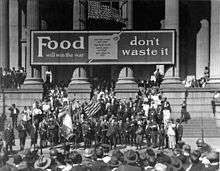
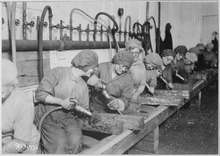
The War Industries Board, headed by Bernard Baruch, was established to set U.S. war manufacturing policies and goals; future President Herbert Hoover led the Food Administration, to conserve food; the Federal Fuel Administration, run by Henry Garfield, introduced daylight saving time and rationed fuel supplies; William McAdoo was in charge of war bond efforts and Vance McCormick headed the War Trade Board. All of the above, known collectively as the "war cabinet", met weekly with Wilson at the White House.[197] These and other bodies were headed by businessmen recruited by Wilson for a dollar-a-day salary to make the government more efficient in the war effort.[198]
More favorable treatment was extended to those unions that supported the U.S. war effort, such as the American Federation of Labor (AFL). Wilson worked closely with Samuel Gompers and the AFL, the railroad brotherhoods, and other 'moderate' unions, which saw enormous growth in membership and wages during Wilson's administration.[199] In the absence of rationing consumer prices soared; income taxes also increased and workers suffered. Despite this, appeals to buy war bonds were highly successful. The purchase of wartime bonds had the result of shifting the cost of the war to the taxpayers of the affluent 1920s.[198]
Anarchists, communists, Industrial Workers of the World members, and other antiwar groups were targeted by the Department of Justice; many of their leaders were arrested for incitement to violence, espionage, or sedition.[200][201] Wilson also established the first western propaganda office, the United States Committee on Public Information, headed by George Creel, the "Creel Commission", which circulated patriotic anti-German appeals and conducted censorship of materials considered seditious.[202] To further counter disloyalty to the war effort at home, Wilson pushed through Congress the Espionage Act of 1917 and the Sedition Act of 1918 to suppress anti-British, pro-German, or anti-war statements.[190] While he welcomed socialists who supported the war, he pushed at the same time to arrest and deport foreign-born enemies.[200] Many recent immigrants, resident aliens without U.S. citizenship, who opposed America's participation in the war were deported to Soviet Russia or other nations under the powers granted in the Immigration Act of 1918.[200][201][203]
In an effort at reform and to shake up his Mobilization program, Wilson removed the chief of the Army Signal Corps and the chairman of the Aircraft Production Board on April 18, 1918.[204] On May 16, the President launched an investigation, headed by Republican Charles Evans Hughes, into the War Department and the Council of Defense. The Hughes report released on October 31 found no major corruption violations or theft in Wilson's Mobilization program, although the report found incompetence in the aircraft program.[205]
With congressional elections approaching, in 1918 Wilson made an appeal to the public for the retention of a Democratic majority and this seriously backfired due to its self-serving tone–Republicans successfully picked up majorities in both houses of Congress.[206][207]
The Fourteen Points
Wilson initiated a secret series of studies named The Inquiry, primarily focused on Europe, and carried out by a group in New York which included geographers, historians and political scientists; the group was directed by Col. House.[208] The studies culminated in a speech by Wilson to Congress on January 8, 1918, wherein he articulated America's long term war objectives. It was the clearest expression of intention made by any of the belligerent nations. The speech, known as the Fourteen Points, was authored mainly by Walter Lippmann and projected Wilson's progressive domestic policies into the international arena. The first six points dealt with diplomacy, freedom of the seas and settlement of colonial claims. Then territorial issues were addressed and the final point, the establishment of an association of nations to guarantee the independence and territorial integrity of all nations—a League of Nations. The address was translated into many languages for global dissemination.[209]
Peace Conference 1919
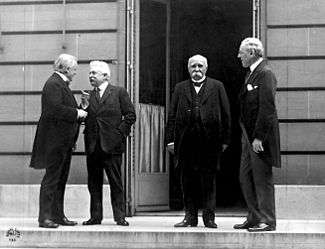
When the time came, Wilson spent six months in Paris for the Peace Conference, thereby becoming the first U.S. president to travel to Europe while in office.[210] He disembarked from the George Washington in Brest on December 13. While in Italy (January 1–6, 1919) for meetings with King Victor Emmanuel III and Prime Minister Vittorio Orlando, he became the first incumbent U.S. president to have an audience with a reigning pope, when he visited Pope Benedict XV at the Apostolic Palace.[211]
Wilson took a break from the negotiations and departed February 14, 1919 for home, then returned to Paris three weeks later and remained until the conclusion of a treaty in June.[212] Heckscher describes Wilson, during the first four weeks of the Conference as, "playing, with force and discretion, a commanding role…he established his priorities, secured accommodation on major issues and won preliminary acceptance of the League."[213] He promoted his plan in France, and then at home in February. Wilson gave a speech at the Metropolitan Opera House in defense of the League—he was more insistent about it than ever. Heckscher contends that the enduring image of Wilson as a grim, unsmiling and unforgiving figure dates from this visit home during the conference.[214] While the general public along with editorial writers, churches and peace groups generally favored the League, the Republicans vowed to defeat the League and discredit Wilson.[215] Wilson notably did not address the Congress as to ongoing deliberations at the peace conference, as indeed his counterpart Lloyd George did with Parliament. Heckscher opines that this was a missed opportunity, even though the Congressional majority had changed. In France he was without the usual control over his message through the media; in fact, the French initiated an aggressive propaganda campaign in the midst of the Conference to affect its outcome.[216]
After his visit home, and while en route back to France, Wilson suffered an illness; the ensuing months brought a decline in health and in power and prestige. On arrival, it was immediately clear the conference had struggled in his absence—Col. House had compromised Wilson's prior gains, and Wilson set out to attempt to regain the lost ground.[217] During these "dark days" of the conference Taft cabled to Wilson three proposed amendments to the League covenant which he thought would considerably increase its acceptability to the Europeans—the right of withdrawal from the League, the exemption of domestic issues from the League and the inviolability of the Monroe Doctrine. Wilson very reluctantly accepted these amendments, explaining why he later was more inflexible in the Senate treaty negotiations.[218] On April 3 Wilson fell violently ill during a conference meeting, in a narrow escape from influenza. Though his symptoms receded within a couple of days, those around him noticed a distinct, lasting deterioration.[219]
The charter of the proposed League of Nations was incorporated into the conference's Treaty of Versailles.[220] Japan proposed that the Covenant include a racial equality clause. Wilson was indifferent to the issue, but acceded to strong opposition from Australia and Britain.[221] After the conference, Wilson said "at last the world knows America as the savior of the world!"[222]
For his peace-making efforts, Wilson was awarded the 1919 Nobel Peace Prize.[223] Economist John Maynard Keynes asserted Wilson was not well regarded at the Conference, "he was in many respects ... ill-informed as to European conditions ... his mind was slow and unadaptable ... There can seldom have been a statesman of the first rank more incompetent than the President in the agilities of the council chamber."[224] Keynes' highly regarded rhetoric became the prevailing judgment of the conference for decades.[225]
Treaty fight, 1919
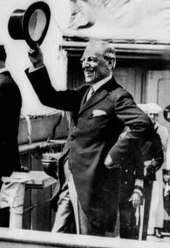
The chances were less than favorable for ratification of the treaty by a two-thirds vote of the Republican Senate. Public opinion was mixed, with intense opposition from most Republicans, Germans, and Irish Catholic Democrats. In numerous meetings with Senators, Wilson discovered opposition had hardened. Despite his weakened physical condition Wilson decided to barnstorm the Western states, scheduling 29 major speeches and many short ones to rally support.[226]
Wilson had earlier downplayed Germany's guilt in starting the war by calling for "peace without victory", but he had taken an increasingly hard stand at Paris and rejected advice to soften the treaty's treatment of Germany.[227] In a reversal of his earlier position, in summer 1919 Wilson repeatedly stressed Germany's guilt, saying the treaty, "seeks to punish one of the greatest wrongs ever done in history, the wrong which Germany sought to do to the world and to civilization; and there ought to be no weak purpose with regard to the application of the punishment. She attempted an intolerable thing, and she must be made to pay for the attempt."[228]
Wilson had a series of debilitating strokes and had to cut short his trip on September 26, 1919. He became an invalid in the White House, closely monitored by his wife, who insulated him from negative news and downplayed for him the gravity of his condition.[229] Senator Lodge led the opposition to the treaty in the Republican controlled Senate; the key point of disagreement was whether the League would diminish the power of Congress to declare war.
It proved possible to build a majority for the treaty in the Senate, but the two-thirds coalition needed to ratify was insurmountable.[230] One block of Democrats strongly supported the Versailles Treaty; a second group supported the Treaty but followed Wilson in opposing any amendments or reservations. The largest bloc—Lodge and the Republicans—wanted a treaty with reservations, especially on Article X, which empowered the League of Nations to make war without a vote by the United States Congress. Finally, a bipartisan group of 13 "irreconcilables" opposed a treaty in any form.[231] In mid-November 1919 Lodge and his Republicans formed a coalition with the pro-Treaty Democrats, and were close to a two-thirds majority for a Treaty with reservations; but the seriously indisposed Wilson rejected this compromise and enough Democrats followed his lead to defeat ratification. Cooper and Bailey suggest that Wilson's stroke in September had debilitated him from negotiating effectively with Lodge.[232]
Post war: 1919–1920
Wilson's administration did effectively demobilize the country at the war's end. A plan to form a commission for the purpose was abandoned in the face of Republican control of the Senate, which complicated the appointment of commission members. Instead, Wilson favored the prompt dismantling of wartime boards and regulatory agencies.[233] Demobilization was chaotic and violent; four million soldiers were sent home with little planning, little money, few benefits, and vague promises. A wartime bubble in prices of farmland burst, leaving many farmers deeply in debt after they purchased new land. There were social tensions as veterans tried to find jobs, and existing workers struggled to protect their jobs, as well as to gain better wages and conditions. Major strikes in the steel, coal, and meatpacking industries disrupted the economy in 1919.[234] These conditions were catalysts for outbreaks of racial animosity that erupted in serious race riots of whites against blacks in Chicago, Omaha, and two dozen other major cities in the North; it was called the Red Summer of 1919.[235]
As the election of 1920 approached, Wilson momentarily imagined that a deadlocked Democratic convention might nominate him for a third term with a campaign focused on the League of Nations. No one around the President adequately clarified for him that he was too incapacitated, had insufficient support, and that the League defeat was irreversible.[236]
Other foreign affairs
Wilson frequently intervened in Latin American affairs, saying in 1913: "I am going to teach the South American republics to elect good men."[237] These interventions included Mexico in 1914, Haiti in 1915, the Dominican Republic in 1916, Cuba in 1917, and Panama in 1918. The U.S. maintained troops in Nicaragua throughout the Wilson administration and used them to select the president of Nicaragua and then to force Nicaragua to pass the Bryan-Chamorro Treaty. Additionally, American troops in Haiti—under the command of the federal government—forced the Haitian legislature to elect as president a pro-Western candidate who was favored by Wilson though less popular among the Haitian citizenry.[238][239] Wilson ordered the military occupation of the Dominican Republic shortly after the resignation of its President Juan Isidro Jimenes Pereyra in 1916. The U.S. military worked in concert with wealthy Dominican landowners to suppress the gavilleros, a campesino guerrilla force fighting the occupation. The occupation lasted until 1924, and was notorious for its brutality against those in the resistance.[240] Wilson also negotiated a treaty with Colombia in which the U.S. apologized for its role in the Panama Revolution of 1903–1904.[241]
After Russia left World War I following the Bolshevik Revolution of 1917, the Allies sent troops there to prevent a German or Bolshevik takeover of allied-provided weapons, munitions and other supplies previously shipped as aid to the pre-revolutionary government.[242] Wilson sent armed forces to assist the withdrawal of Czechoslovak Legions along the Trans-Siberian Railway, and to hold key port cities at Arkhangelsk and Vladivostok. Though specifically instructed not to engage the Bolsheviks, the U.S. forces engaged in several armed conflicts against forces of the new Russian government. Revolutionaries in Russia resented the United States intrusion. Robert Maddox wrote, "The immediate effect of the intervention was to prolong a bloody civil war, thereby costing thousands of additional lives and wreaking enormous destruction on an already battered society."[243] Wilson withdrew most of the soldiers on April 1, 1920, though some remained until as late as 1922.
In 1919, Wilson guided American foreign policy to "acquiesce" in the Balfour Declaration without supporting Zionism in an official way. Wilson expressed sympathy for the plight of Jews, especially in Poland and France.[244]
In May 1920, Wilson sent a long-deferred proposal to Congress to have the U.S. accept a mandate from the League of Nations to take over Armenia.[245] Bailey notes this was opposed by American public opinion,[246] while Richard G. Hovannisian states that Wilson "made all the wrong arguments" for the mandate and focused less on the immediate policy than on how history would judge his actions: "[he] wished to place it clearly on the record that the abandonment of Armenia was not his doing."[247] The resolution won the votes of only 23 senators.
Incapacity
The immediate cause of Wilson's incapacity in September 1919 was the physical strain of the public speaking tour he undertook in support of ratification of the Treaty of Versailles. In Pueblo, Colorado, on September 25, 1919, he collapsed and never fully recovered.[248]
On October 2, 1919, he suffered a serious stroke, leaving him paralyzed on his left side, along with blindness in his left eye and partial vision in his right eye.[249] He was confined to bed for several weeks and sequestered from everyone except his wife Edith and his physician, Dr. Cary Grayson.[250] For some months, Wilson used a wheelchair and later he required use of a cane. His wife Edith and his aide Joe Tumulty were said to have helped a journalist, Louis Seibold, present a false account of an interview with the President.[251]
He was insulated by his wife, who selected matters for his attention and delegated others to his cabinet. Wilson temporarily resumed a perfunctory attendance at cabinet meetings.[252] By February 1920, the President's true condition was publicly known. At issue was Wilson's fitness for the presidency at a time when the League fight was reaching a climax, and domestic issues such as strikes, unemployment, inflation and the threat of Communism were ablaze. No one close to him, including his wife, his physician, or personal assistant, was willing to admit he was unable to perform the duties of the presidency.[253] Because of this complex case, and the subsequent realization of the difficulties that might have been experienced in the nuclear age if, instead of being assassinated in 1963, John F. Kennedy had been left in a permanent vegetative state on account of his brain injuries, the 25th Amendment was ratified in 1967 to allow the voluntary or forcible replacement of an unable or unwilling incumbent.[254]
Prohibition
Prohibition developed as an unstoppable reform during the war, but Wilson played a minor role in its passage.[255] A combination of the temperance movement, hatred of everything German (including beer and saloons), and activism by churches and women led to ratification of an amendment to achieve Prohibition in the United States. A Constitutional amendment passed both houses in December 1917 by 2/3 votes. By January 16, 1919, the Eighteenth Amendment had been ratified by 36 of the 48 states it needed. On October 28, 1919, Congress passed enabling legislation, the National Prohibition Act (informally known as the Volstead Act), to enforce the Eighteenth Amendment. Wilson felt Prohibition was unenforceable, but his veto of the Volstead Act was overridden by Congress.[256] Prohibition began on January 16, 1920 (one year after ratification of the amendment); the manufacture, importation, sale, and transport of alcohol were prohibited, except for limited cases such as religious purposes (as with sacramental wine). But, the consumption of alcohol was never prohibited, and individuals could maintain a private stock that existed before Prohibition went into effect. Wilson moved his private supply of alcoholic beverages to the wine cellar of his Washington residence after his term of office ended.[257][258][259][260]
Wilson's position that nationwide Prohibition was unenforceable came to pass as a black market quickly developed to evade restrictions, and considerable liquor was both manufactured and smuggled into the country. Speakeasies thrived in cities, towns and rural areas.
Women's suffrage
Wilson favored women's suffrage at the state level, but held off support for a nationwide constitutional amendment because his party was sharply divided. The white South was the main center of opposition—only Arkansas gave women voting rights. From 1917 to 1919, a highly visible campaign by the National Woman's Party (NWP) disparaged Wilson and his party for not enacting any amendment on the matter. Wilson did keep in close touch with the much larger and more moderate suffragists of the National American Woman Suffrage Association. He continued to hold off until he was sure the Democratic Party in the North was supportive; the 1917 referendum in New York State in favor of suffrage proved decisive for him and he now came out strongly in support of national suffrage in a January 1918 speech to Congress. Applauding the vitality of women during the First World War, he asked Congress, "We have made partners of the women in this war… Shall we admit them only to a partnership of suffering and sacrifice and toil and not to a partnership of privilege and right?"[261] The House passed a constitutional amendment, but it stalled in the Senate.[262] Wilson continued to speak in its defense, consulting with members of Congress through personal and written appeals, often on his own initiative.[261] Then on June 4, 1919, the proposed amendment prohibiting the states and the federal government from denying the right to vote to citizens of the United States on the basis of sex, was approved, and submitted it to the state legislatures for ratification.[262] It was ratified by the requisite 36 states thanks to Tennessee, and on August 18, 1920, the measure became the Nineteenth Amendment to the United States Constitution.[263]
Post war economic depression
According to historian Adam Tooze, Wilson's presidency came to a calamitous end[264] with an economic depression. Christina Romer that wrote that data from the NBER (National Bureau of Economic Research) shows that the depression lasted 18 months.[265][266]
Administration and Cabinet
Wilson's chief of staff ("Secretary") was Joseph Patrick Tumulty from 1913 to 1921, but he was largely upstaged after 1916 when Wilson's second wife, Edith Bolling Galt Wilson, assumed full control of Wilson's schedule. The most important foreign policy advisor and confidant was "Colonel" Edward M. House until Wilson broke with him in early 1919, for his missteps at the peace conference in Wilson's absence.[267]
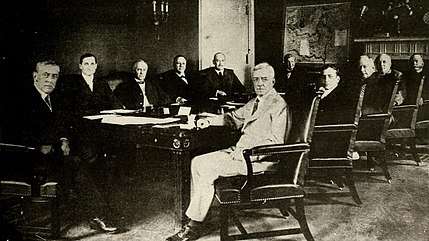
| The Wilson Cabinet | ||
|---|---|---|
| Office | Name | Term |
| President | Woodrow Wilson | 1913–1921 |
| Vice President | Thomas R. Marshall | 1913–1921 |
| Secretary of State | William J. Bryan | 1913–1915 |
| Bainbridge Colby | 1920–1921 | |
| Robert Lansing | 1915–1920 | |
| Secretary of Treasury | William G. McAdoo | 1913–1918 |
| David F. Houston | 1920–1921 | |
| Carter Glass | 1918–1920 | |
| Secretary of War | Lindley M. Garrison | 1913–1916 |
| Newton D. Baker | 1916–1921 | |
| Attorney General | James C. McReynolds | 1913–1914 |
| A. Mitchell Palmer | 1919–1921 | |
| Thomas W. Gregory | 1914–1919 | |
| Postmaster General | Albert S. Burleson | 1913–1921 |
| Secretary of the Navy | Josephus Daniels | 1913–1921 |
| Secretary of the Interior | Franklin K. Lane | 1913–1920 |
| John B. Payne | 1920–1921 | |
| Secretary of Agriculture | David F. Houston | 1913–1920 |
| Edwin T. Meredith | 1920–1921 | |
| Secretary of Commerce | William C. Redfield | 1913–1919 |
| Joshua W. Alexander | 1919–1921 | |
| Secretary of Labor | William B. Wilson | 1913–1921 |
Judicial appointments
Supreme Court
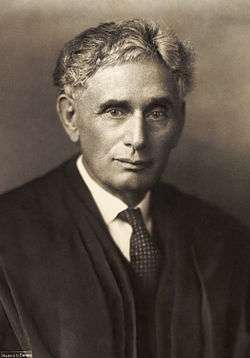
Wilson appointed three Associate Justices to the Supreme Court of the United States:
- James Clark McReynolds in 1914. A conservative, he served more than 26 years and opposed the New Deal.
- Louis Dembitz Brandeis in 1916. A liberal, and the first Jew appointed to the Court, he served 22 years and wrote landmark opinions on free speech and right to privacy.
- John Hessin Clarke in 1916. He served just 6 years on the Court before resigning. He thoroughly disliked his work as an Associate Justice.
Other courts
Along with his Supreme Court appointments, Wilson appointed 20 judges to the United States Courts of Appeals and 52 judges to the United States district courts.
Final years and death
After the end of his second term in 1921, Wilson and his wife moved from the White House to an elegant 1915 town house in the Embassy Row (Kalorama) section of Washington, D.C.[268] Wilson continued daily drives, and attended Keith's vaudeville theatre on Saturday nights. Wilson was one of only two U.S. Presidents (Theodore Roosevelt was the first) to have served as president of the American Historical Association.[269]
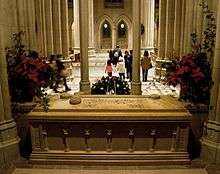
In 1921, Wilson opened a law office with former Secretary of State Bainbridge Colby, but Wilson's second attempt at practicing law proved no more enjoyable than his first, and the practice was closed by the end of 1922. Wilson experienced more success with his return to writing, and he published short works on the international impact of the American Revolution and the rise of totalitarianism. He also campaigned for Democratic candidates in the 1922 elections, and he hinted to friends that he might pursue a third term in the 1924 presidential election.[270] In August 1923, he attended the funeral of his successor, Warren G. Harding.[271]
On November 10, 1923, Wilson made a short Armistice Day radio speech from the library of his home, his last national address. The following day he spoke briefly from the front steps to more than 20,000 well wishers gathered outside the house.[268][272][273]
On February 3, 1924, Wilson died at home of a stroke and other heart-related problems at age 67. He was interred in a sarcophagus in Washington National Cathedral and is the only president interred in the nation's capital.[274] Mrs. Wilson stayed in the home another 37 years, dying there at age 89 on December 28, 1961, which was Woodrow's birthday and the day she was to be the guest of honor at the opening of the Woodrow Wilson Bridge across the Potomac River near Washington. Mrs. Wilson left the home and much of the contents to the National Trust for Historic Preservation to be made into a museum honoring her husband. The Woodrow Wilson House opened to the public in 1963, was designated a National Historic Landmark in 1964, and was listed on the National Register of Historic Places in 1966.[275]
Wilson left his daughter Margaret an annuity of $2,500 annually for as long as she remained unmarried, and left to his daughters what had been his first wife's personal property. The rest he left to Edith as a life estate with the provision that at her death, his daughters would divide the estate among themselves.[276]
Wilson's presidential papers and his personal library are at the Library of Congress.[277]
Race relations
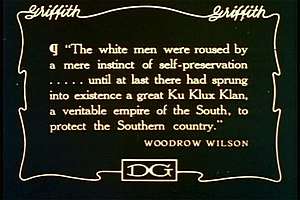
Wilson was the first Southerner to be elected president since Zachary Taylor in 1848: his ascension to the presidency was thus celebrated by Southern segregationists. Wilson himself identified with the "Lost Cause" view of the Confederacy, which downplayed the importance of slavery to the Confederate cause, instead arguing that it was an attempt to defend a Southern agrarian way of life against Northern intrusion.[278]
Several historians have spotlighted consistent examples in the public record of Wilson's overtly racist policies and political appointments, such as segregationists he placed in his cabinet.[279][280][281][282][283] According to scholars, Wilson believed that slavery was wrong on economic labor grounds, rather than for moral reasons.[283] They also argue that he idealized the slavery system in the South, viewing masters as patient with indolent slaves.[283] In terms of Reconstruction, Wilson held the common southern view that the South was demoralized by Northern carpetbaggers and that overreach on the part of the Radical Republicans justified extreme measures to reassert Democratic national and state governments.[284][285][286]
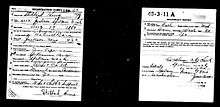
While president of Princeton University, Wilson had discouraged blacks from applying for admission, preferring to keep the peace among white students and alumni.[287] Wilson's History of the American People (1901) dismissed lynchings committed by the Ku Klux Klan of the late 1860s as a lawless reaction to a lawless period. The President defended them, writing that "[the Klan] began to attempt by intimidation what they were not allowed to attempt by the ballot or by any ordered course of public action".[288] The book also criticised Reconstruction as "the dominance of an ignorant and inferior race" and described granting voting rights to blacks as a "menace to society".[278]
Wilson's War Department drafted hundreds of thousands of blacks into the army, giving them equal pay with whites, but in accord with military policy from the Civil War through the Second World War, kept them in all-black units with white officers, and kept the great majority out of combat.[289] In 1918, W. E. B. Du Bois—a leader of the NAACP who had campaigned for Wilson believing he was a "liberal southerner"—was offered an Army commission in charge of dealing with race relations; DuBois accepted, but he failed his Army physical and did not serve.[290][291] By 1916, Du Bois opposed Wilson, charging that his first term had seen "the worst attempt at Jim Crow legislation and discrimination in civil service that [blacks] had experienced since the Civil War."[291]
During Wilson's presidency, the film The Birth of a Nation (1915) became the first motion picture to be in screened in the White House.[292] It was adapted from The Clansman, by Wilson's old friend Thomas Dixon Jr. The film, while revolutionary in its cinematic technique, glorified the Ku Klux Klan and portrayed blacks as uncouth and uncivilized. Three of Wilson's quotes were used for intertitles in the film, one describing the Reconstruction as a time when "[A]dventurers swarmed out of the North ... to cozen, beguile, and use the Negroes.…In the villages the Negroes were the office holders, men who knew none of the uses of authority, except its insolences", another claiming that Congressional leaders of that time wanted to "put the white South under the heel of the black South", and a third suggesting that the Klan grew out of "the white men of the South (being) aroused by a mere instinct of self-preservation".[278] After seeing the film, Wilson felt betrayed by Dixon, and did not like or endorse the film. Wilson tried to stop its showing during the World War.[293] Biographer Cooper rejects the allegation first made in 1937 by a magazine writer who said that Wilson remarked: "It is like writing history with lightning, and my only regret is that it is all so terribly true"; an eyewitness reports that Wilson said nothing.[294][295]
During Wilson's term, segregation was ordered in the Washington offices of the Navy, the Treasury, and the Postmaster General, and photographs became required for all new federal job applicants. When a delegation of black professionals from the National Independent Political League, led by newspaper editor William Monroe Trotter, protested the discriminatory actions, Wilson told them "segregation is not a humiliation but a benefit, and ought to be so regarded by you gentlemen", explained he was trying to "reduce friction," and that he "sincerely believe[d] it to be in their interest". When Trotter countered by arguing that it was "untenable ... to maintain that the segregation is simply to avoid race friction" as black and white clerks had worked together harmoniously for fifty years, Wilson rebuked him, stating that if the League wanted to meet with him again "it must have another spokesman. Your manner offends me". Trotter was then ordered to leave the White House.[296][278] Under Wilson, racial segregation was quickly implemented at the Post Office Department, and many African-American employees were downgraded and even fired. Employees who were downgraded were transferred to the dead letter office, where they did not interact with the public. The few African Americans who remained at the main post offices were put to work behind screens, out of customers' sight.[297] The Wilson administration's pro-segregation positions were criticised not only by black leaders, but by their white allies: journalist Oswald Garrison Villard suggested that the administration had "allied itself with the forces of reaction, and put itself on the side of every torturer, of every oppressor, of every perpetrator of racial injustice in the South or the North". Although Villard subsequently corresponded with and met with Wilson about the issue, no change in policy was forthcoming.[278]
Memorials
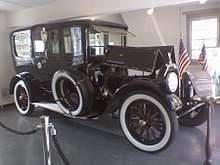
The largest denomination of U.S. currency ever printed, the $100,000 bill bears Wilson's portrait (meant for use only among Federal Reserve Banks).
The Woodrow Wilson School of Public and International Affairs was founded at Princeton in 1930. It was created in the spirit of Wilson's interest in preparing students for leadership in public and international affairs.
Shadow Lawn, the Summer White House for Wilson during his term in office, became part of Monmouth University in 1956. The college has placed a marker on the building, renamed Woodrow Wilson Hall, commemorating the home. It was declared a National Historic Landmark in 1985.
In 1944, Darryl F. Zanuck of 20th Century Fox produced a film titled Wilson. It looked back with nostalgia to Wilson's presidency, especially concerning his role as commander-in-chief during World War I.
A section of the Rambla of Montevideo, Uruguay, is named Rambla Presidente Wilson. A street in the 16th arrondissement in Paris, running from Trocadéro to the Place de l'Alma, is named the Avenue du Président Wilson. The Pont Wilson crosses the Rhône river in the center of Lyon, France. The Boulevard du Président Wilson extends from the main train station of Strasbourg and connects to the Boulevard Clemenceau. In Bordeaux, the Boulevard du Président Wilson links to the Boulevard George V. The Quai du Président Wilson forms part of the port of Marseille. Praha hlavní nádraží, the main railway station of Prague has, for much of its history, been known as the "Wilson Station" (Czech: Wilsonovo nádraží), and features the Woodrow Wilson Monument. The Woodrow Wilsonsquare in Ghent, Belgium.
In 2010, Wilson was inducted into the New Jersey Hall of Fame.[298]
One year after Wilson's death the U.S. Post Office issued the first postage stamp honoring the late president. Since then, four more stamps were issued in Wilson's honor, the last being issued in 1998.[299][300]
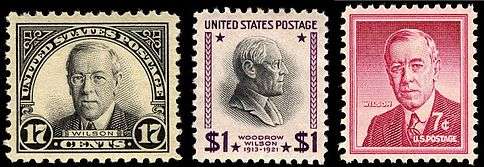 17c – issued in 1925; $1 – issued in 1938; 7c – issued in 1956.[301] |
Works
Woodrow Wilson was also an accomplished author and scholar, having written numerous books and essays.
Books:
- Congressional Government, A Study in American Politics. Boston: Houghton, Mifflin and Company. 1885 – via Internet Archive.
- George Washington. New York and London: Harper & Brothers Publishers. 1896 – via Internet Archive.
- On Being Human, 1897.
- The State: Elements of Historical and Practical Politics, 1898.
- A History of the American People. New York and London: Harper & Brothers Publishers. 1902 – via Internet Archive. volume I; volume II; volume III; volume IV; volume V.
- Constitutional Government in the United States, 1908.
- The New Freedom, 1913.
- When A Man Comes To Himself, 1915.
Essays:
Media
 The Signing of Peace in the Hall of Mirrors, by William Orpen (1919), depicts Wilson holding papers in the center left
The Signing of Peace in the Hall of Mirrors, by William Orpen (1919), depicts Wilson holding papers in the center left
See also
Notes
- ↑ John Milton Cooper, Woodrow Wilson: A Biography p. 201
- ↑ Arthur M. Schlesinger, Jr., "Ranking the Presidents: From Washington to Clinton". Political Science Quarterly (1997). 112#2: 179–90.
- ↑ Heckscher (1991), p. 4.
- 1 2 Cooper, John Milton, Jr. (2009). Woodrow Wilson: A Biography. Knopf Doubleday Publishing Group. pp. 13–19. ISBN 978-0-307-27301-7.
- ↑ "Genealogy of President Woodrow Wilson". Wc.rootsweb.ancestry.com. Retrieved September 11, 2010.
- ↑ Walworth 1958 p. 4
- ↑ Louis., Auchincloss, (2000). "Chapter One: Woodrow Wilson". Woodrow Wilson. New York: Viking. ISBN 0670889040. OCLC 42420886.
- 1 2 White, William Allen (2007). "Chapter II: The Influence of Environment". Woodrow Wilson – The Man, His Times and His Task. ISBN 978-1-4067-7685-0.
- ↑ Heckscher (1991), p. 23.
- ↑ Heckscher (1991), p. 22
- ↑ Walworth ch. 1
- ↑ "Princeton Periodicals – Daily Princetonian Special Class of 1971, Volume 91, Number 72, Issue 15 June 1967". Theprince.princeton.edu. June 15, 1967. Retrieved September 2, 2012.
- ↑ Link, Wilson I:5–6; Wilson Papers I: 130, 245, 314
- ↑ "Princeton Periodicals – Daily Princetonian 5 December 1895". Theprince.princeton.edu. Retrieved September 2, 2012.
- ↑ Heckscher (1991), p. 35.
- ↑ Heckscher (1991), p. 53.
- ↑ Cranston 1945
- ↑ Heckscher (1991), pp. 58–59.
- ↑ Mulder, John H. (1978). Woodrow Wilson: The Years of Preparation. Princeton. pp. 71–72.
- ↑ Mulder, John M. (March 8, 2015). "Woodrow Wilson: The Years of Preparation. Wilson Supplemental Volumes: The Years of Preparation. Wilson Supplemental Volumes". Princeton University Press – via Google Books.
- ↑ "The American Magazine". Colver Publishing House. March 1, 2018 – via Google Books.
- ↑ Internet Archive: Congressional Government: A Study in American Politics (1885), accessed January 6, 2011
- ↑ Pestritto, Ronald (2005). Woodrow Wilson and the Roots of Modern Liberalism. Lanham, Maryland: Rowman & Littlefield. p. 34. ISBN 0-7425-1517-6. Retrieved March 22, 2010.
- ↑ Heckscher (1991), pp. 62–65.
- ↑ Heckscher, pp. 71–73.
- ↑ "The Pierce Arrow Limousine", Woodrow Wilson Presidential Library
- ↑ Weingroff, Richard F., "President Woodrow Wilson – Motorist Extraordinaire", Federal Highway Administration
- ↑ "By the Numbers" – 1915, CNNSI, October 17, 2002. Retrieved February 27, 2010.
- ↑ Wilson, Andrew (1996), A President's Love Affair with the Lake District: Woodrow Wilson's 'Second Home, Lakeland Press Agency
- ↑ Van Natta, Don Jr. (2003), First Off the Tee: Presidential Hackers, Duffers, and Cheaters from Taft to Bush PublicAffairs
- ↑ Heckscher, pp. 77–82.
- ↑ Heckscher, p. 85.
- ↑ Heckscher, pp. 93–94.
- ↑ https://www.pbk.org/WEB/pbkdocs/Phi%20Beta%20Kappa%20Presidents%20.pdf
- ↑ Heckscher, p. 96.
- ↑ Heckscher, p. 104.
- ↑ Heckscher, p. 106.
- ↑ Walworth, v. 1; Link (1947)
- ↑ "Beyond FitzRandolph Gates", Princeton Weekly Bulletin June 22, 1998.
- ↑ The college he was referring to was Centre College. Link (1947)
- ↑ The Politics of Woodrow Wilson, 41–48
- ↑ Heckscher, pp. 75–76, 83
- ↑ Heckscher, p. 83.
- ↑ Heckscher, p. 101.
- ↑ Heckscher, p. 103.
- ↑ Heckscher, p. 142.
- ↑ The Presidency of Woodrow Wilson by Kendrick. A. Clements
- ↑ Wilson, Congressional Government (1885), pp. 186–187.
- ↑ Wilson Congressional Government 1885, p. 76.
- ↑ Frozen Republic, 145
- ↑ Saunders, Robert M. (1998). In Search of Woodrow Wilson: Beliefs and Behavior. Westport, Connecticut: Greenwood Press. p. 13. ISBN 0-313-30520-X.
- ↑ Jr, John Milton Cooper; Scholars, Woodrow Wilson International Center for (September 30, 2008). "Reconsidering Woodrow Wilson: Progressivism, Internationalism, War, and Peace". Woodrow Wilson Center Press – via Google Books.
- ↑ Railway and Locomotive Engineering: A Practical Journal of Railway Motive Power and Rolling Stock, Volume 25, A. Sinclair Company, 1912, p. 55
- ↑ Wilson 3
- ↑ "The Study of Administration" in Political Science Quarterly, June 1887
- ↑ Wilson, 4
- ↑ Wilson 5
- ↑ Wilson, 10
- ↑ Wilson, 11
- ↑ Wilson, 12
- ↑ Heckscher, p. 110.
- ↑ Walworth v. 1
- ↑ Walworth v. 1; Bragdon, Woodrow Wilson: The Academic Years (1967)
- 1 2 Heckscher, p. 155.
- ↑ Bragdon, Woodrow Wilson: The Academic Years; Walworth v. 1; Link (1947)
- ↑ Heckscher, p. 156.
- ↑ Heckscher, p. 174.
- ↑ Cooper (2009) pp. 99–101.
- ↑ Walworth 1:109
- ↑ Bragdon, Woodrow Wilson: The Academic Years, 326–27.
- ↑ Heckscher, p. 173.
- ↑ Heckscher, p. 183.
- ↑ Heckscher, p. 176.
- ↑ Cooper, John Milton. Woodrow Wilson: A Biography. p. 107
- ↑ Walworth, v 1 ch 6, 7, 8
- ↑ Heckscher, p. 203.
- ↑ Heckscher, p. 208.
- ↑ Heckscher, pp. 194, 202–03
- ↑ Heckscher, p. 214.
- ↑ Heckscher, p. 215.
- ↑ Biography of Woodrow Wilson (PDF), New Jersey State Library.
- ↑ Morris, Edmund, "The Tea Party Last Time, Op-ed, The New York Times, October 31, 2010 (November 1, 2010 p. A33 NY ed.). Retrieved November 1, 2010.
- ↑ Heckscher, p. 220.
- ↑ Heckscher, pp. 216–17.
- ↑ Heckscher, pp. 225–27.
- ↑ The Survey, Volume 30, Survey Associates, 1913, p. 140
- ↑ Woodrow Wilson and New Jersey Made Over by Hester E. Hosford, New York : G.P. Putnam's Sons, 1912, p. 88
- ↑ Woodrow Wilson by John Milton Cooper, Jr. 6: Governor, p. 135
- ↑ Woodrow Wilson by John Milton Cooper, Jr. 6: Governor p. 134
- ↑ Heckscher, p. 230
- ↑ Heckscher, p. 231
- ↑ Heckscher, pp. 231–32
- ↑ Arthur S. Link, "Woodrow Wilson: The American as Southerner," Journal of Southern History (1970) 36#1 pp. 3–17 in JSTOR
- ↑ Arthur S. Link, "Democratic Politics and the Presidential Campaign of 1912 in Tennessee", East Tennessee Historical Society's Publications 1979 51: 114–37
- ↑ Heckscher, pp. 232–33.
- ↑ Heckscher, p. 234.
- ↑ Heckscher, p. 238.
- ↑ Heckscher, p. 245.
- ↑ Heckscher, p. 247.
- ↑ Heckscher, p. 246.
- ↑ Heckscher, p. 249.
- ↑ Heckscher, p. 250.
- ↑ Arthur S. Link, "The Baltimore Convention of 1912", American Historical Review 1945 50(4): 691–713 in JSTOR
- ↑ Cooper (2009), 163–68
- ↑ Heckscher, pp. 254–55.
- ↑ Heckscher, pp. 258–59.
- ↑ Heckscher, p. 260.
- ↑ Heckscher, pp. 256–57.
- ↑ Heckscher, p. 261.
- ↑ The Warrior and the Priest: Woodrow Wilson and Theodore Roosevelt By John Milton Cooper, III The Great Campaign, 11 Insurgent, p. 184
- ↑ Heckscher, p. 262.
- ↑ J. Morgan Kousser, The Shaping of Southern Politics: Suffrage Restriction and the Establishment of the One-Party South, 1880–1910,
- ↑ "Committee at Odds on Reapportionment", The New York Times, December 20, 1900, accessed March 10, 2008
- ↑ Lewis L. Gould, Four Hats in the Ring: The 1912 Election and the Birth of Modern American Politics (2008), p. ??
- ↑ Cooper, John Milton. "Woodrow Wilson: A Biography". p. 187
- ↑ Heckscher, pp. 265–67.
- ↑ Heckscher, p. 274.
- 1 2 William Keylor, "The long-forgotten racial attitudes and policies of Woodrow Wilson", March 4, 2013, Professor Voices, Boston University, accessed March 10, 2016
- ↑ Heckscher, p. 276.
- ↑ Heckscher, p. 277.
- ↑ Heckscher, pp. 278–80.
- ↑ Heckscher, pp. 283–84.
- ↑ Rouse, Robert (March 15, 2006). "Happy Anniversary to the first scheduled presidential press conference – 93 years young!". American Chronicle. Archived from the original on September 13, 2008.
- ↑ Arthur S. Link, "Woodrow Wilson: The American as Southerner", Journal of Southern History, Vol. 36, No. 1 (1970), pp. 3–17 in JSTOR
- 1 2 3 4 5 6 7 Kathleen L. Wolgemuth, "Woodrow Wilson and Federal Segregation", The Journal of Negro History Vol. 44, No. 2 (Apr. 1959), pp. 158–73, accessed March 10, 2016
- ↑ Kennedy, Ross A. (2013). A Companion to Woodrow Wilson. John Wiley & Sons. pp. 171–74. ISBN 9781118445402.
- ↑ Heckscher, pp. 291–92.
- ↑ August Meier and Elliott Rudwick. "The Rise of Segregation in the Federal Bureaucracy, 1900–1930." Phylon (1960) 28.2 (1967): 178–84. in JSTOR
- ↑ Herbert P. Le Pore, "Prelude to Prejudice: Hiram Johnson, Woodrow Wilson, and the California Alien Land Law Controversy of 1913." Southern California Quarterly 61.1 (1979): 99–110. in JSTOR
- ↑ Link (1954) pp. 84–87
- 1 2 Heckscher, p. 304.
- ↑ Link (1972)
- ↑ Clements, Presidency ch. 3
- ↑ Dewey W. Grantham, "Southern congressional leaders and the new freedom, 1913–1917." Journal of Southern History 13#4 (1947): 439–59.
- ↑ Arthur S. Link, '"Wilson: The New Freedom (1956) pp. 177–98
- ↑ Vincent W. Howard, "Woodrow Wilson, The Press, and Presidential Leadership: Another Look at the Passage of the Underwood Tariff, 1913," CR: The Centennial Review, (1980)24#2 pp. 167–84
- ↑ Heckscher, pp. 316–17.
- ↑ Link (1954) pp. 43–53
- ↑ Clements, Presidency, pp. 40–44.
- ↑ Keleher, Robert (March 1997). "The Importance of the Federal Reserve". Joint Economic Committee. U.S. House of Representatives. Archived from the original on February 28, 2008.
- ↑ Link, Wilson: The New Freedom (1956) pp. 199–240
- ↑ Cooper, John Milton. "Woodrow Wilson: A Biography". p. 195
- ↑ Heckscher, p. 321.
- ↑ Ramírez, Carlos D.; Eigen-Zucchi, Christian (2001). "Understanding the Clayton Act of 1914: An Analysis of the Interest Group Hypothesis". Public Choice. 106 (1–2): 157–81. doi:10.1023/A:1005201409149.
- ↑ Heckscher, pp. 325–26.
- ↑ Clements, Presidency, ch. 4.
- ↑ H.D. Hindman Child labor: an American history (2002)
- ↑ Peter V. N. Henderson, "Woodrow Wilson, Victoriano Huerta, and the Recognition Issue in Mexico," The Americas (1984) 41#2 pp. 151–76 in JSTOR
- ↑ Cooper (2009) 320–23
- ↑ Link Wilson 4: 194–221, 280–318. Link Wilson 5:51–54, 328–39
- ↑ Heckscher, p. 330.
- ↑ Heckscher, pp. 333–35.
- ↑ Heckscher, p. 345.
- ↑ Heckscher, p. 347.
- ↑ Barry Hankins (26 May 2016). Woodrow Wilson: Ruling Elder, Spiritual President. OUP Oxford. pp. 166–. ISBN 978-0-19-102818-2.
- ↑ James S. McCallops (2003). Edith Bolling Galt Wilson: The Unintended President. Nova Publishers. pp. 11, 12–. ISBN 978-1-59033-556-7.
- ↑ Heckscher, pp. 348–50.
- ↑ Heckscher, pp. 352–53.
- ↑ Heckscher, pp. 350, 356.
- ↑ Heckscher, p. 339.
- ↑ Arthur S. Link (1960). Wilson, Volume III: The Struggle for Neutrality, 1914-1915. p. 66. ISBN 9781400875832.
- ↑ E.M. House, Intimate Papers of Colonel House, Vol. 1 1912–1915 edited by Charles Seymour, (1926) vol. 1 p. 299, dated August 30, 1914
- ↑ Clements, Presidency, ch. 7.
- ↑ Heckscher, p. 361.
- ↑ Heckscher, pp. 363, 365.
- ↑ Heckscher, pp. 366–69..
- ↑ Heckscher, p. 378.
- ↑ Heckscher, pp. 384–85
- ↑ Heckscher, p. 387.
- ↑ Heckscher, p. 392.
- ↑ Cooper, Woodrow Wilson (2009) pp. 362–76
- ↑ Heckscher, pp. 393–94.
- ↑ Heckscher, pp. 396–97.
- ↑ Heckscher, p. 409.
- ↑ Heckscher, p. 397.
- ↑ Godfrey Hodgson (2006). Woodrow Wilson's Right Hand: The Life of Colonel Edward M. House. Yale University Press. p. 126. ISBN 0300092695.
- ↑ "Woodrow Wilson: Speech of Acceptance". Presidency.ucsb.edu. September 2, 1916. Retrieved September 11, 2010.
- ↑ Cooper, John Milton Jr. Woodrow Wilson p. 335
- ↑ "Miss Wilson to Aid the Women". St. Petersburg Daily Times. March 5, 1913 – via Google News.
- ↑ Wilson, Woodrow. Quote No. 3489, in The American Presidency Project.
- ↑ William M. Leary, Jr. 'Woodrow Wilson, Irish Americans, and the Election of 1916', The Journal of American History, Vol. 54, No. 1. (June 1967), pp. 57–72. in JSTOR
- ↑ Heckscher, p. 415.
- 1 2 Proceedings of the Conference on Social Insurance. U.S. Government Printing Office. 1917. p. 839.
- ↑ Heckscher, pp. 401–03, 430.
- ↑ Heckscher, p. 427.
- ↑ Thomas Boghardt, The Zimmermann telegram: intelligence, diplomacy, and America's entry into World War I (2012).
- ↑ Heckscher, pp. 428–29
- ↑ Heckscher, pp. 436–37
- ↑ For detailed coverage of the speech see NY Times main headline, April 2, 1917, President Calls for War Declaration, Stronger Navy, New Army of 500,000 Men, Full Cooperation With Germany's Foes
- 1 2 Cooper, John Milton, Reconsidering Woodrow Wilson: Progressivism, Internationalism, War, and Peace, Baltimore MD: Johns Hopkins University Press, ISBN 978-0-8018-9074-1 (2008), p. 190
- ↑ See "World War I" Digital History
- 1 2 Berg, A. Scott (2013). Wilson. New York: G.P. Putnam's Sons. p. 339. ISBN 978-1-101-63641-1.
- ↑ David F. Trask, The United States in the Supreme War Council: American War Aims and Inter-Allied Strategy, 1917–1918 (1961).
- ↑ Edward M. Coffman, The War to End All Wars (1968) ch. 3
- ↑ Georg Schild, review of Carl J. Richard "When the United States Invaded Russia: Woodrow Wilson's Siberian Disaster." Journal of American History 100.3 (2013): 864–64.online
- ↑ Heckscher, pp. 479–88.
- ↑ Heckscher, p. 469.
- 1 2 Clements, Presidency ch 8
- ↑ Spencer C. Tucker (2014). World War I: The Definitive Encyclopedia and Document Collection. ABC-CLIO. p. 85. ISBN 9781851099658.
- 1 2 3 Avrich, Paul, Sacco and Vanzetti: The Anarchist Background, Princeton: Princeton University Press, ISBN 0-691-02604-1, ISBN 978-0-691-02604-6 (1991), pp. 93–94, 124, 127, 130–33
- 1 2 Cooper, John Milton, Reconsidering Woodrow Wilson: Progressivism, Internationalism, War, and Peace, Baltimore, Johns Hopkins University Press, ISBN 978-0-8018-9074-1 (2008), pp. 201, 209
- ↑ "Records of the Committee on Public Information". archives.gov. May 19, 2015.
- ↑ Murray, Robert K., Red Scare: A Study in National Hysteria, 1919–1920 (1955), pp. 250–51
- ↑ Leuchtenburg (1974), pp. 255–56
- ↑ Leuchtenburg (1974), pp. 256–57; U.S. Department of Justice (1918), Report on the Aircraft Inquiry, Washington D.C.; Pusey, Hughes, I, pp. 378–82
- ↑ Robert P. Saldin (2010). War, the American State, and Politics since 1898. Cambridge UP. pp. 84–85. ISBN 9781139491877.
- ↑ Seward W. Livermore, "The Sectional Issue in the 1918 Congressional Elections." Mississippi Valley Historical Review 35#1 (1948): 29–60. in JSTOR
- ↑ Heckscher, p. 470.
- ↑ Heckscher, p. 471.
- ↑ Heckscher, p. 458.
- ↑ "Travels of President Woodrow Wilson". U.S. Department of State Office of the Historian.
- ↑ Heckscher, p. 500
- ↑ Heckscher, p. 536.
- ↑ Heckscher, p. 538.
- ↑ Heckscher, p. 539.
- ↑ Heckscher, p. 541.
- ↑ Heckscher, pp. 544–45.
- ↑ Heckscher, pp. 551–53.
- ↑ Heckscher, p. 555.
- ↑ Arnold M. Rice, John A. Krout, United States History From 1865, (HarperCollins, 1991), p. 180.
- ↑ Naoko Shimazu (1998). Japan, Race, and Equality: The Racial Equality Proposal of 1919. NY: Routledge. pp. 154ff. ISBN 9780415497350.
- ↑ President Woodrow Wilson speaking on the League of Nations to a luncheon audience in Portland OR. 66th Cong., 1st sess. Senate Documents: Addresses of President Wilson (May–November 1919), vol.11, no. 120, p. 206.
- ↑ "Woodrow Wilson bio sketch". Nobel Media AB 2014.
- ↑ John Maynard Keynes, The Economic Consequences of the Peace (London: MacMillan, 1923),available online
- ↑ Heckscher, p. 589.
- ↑ A. Scott Berg, Wilson (2013), pp. 619–34
- ↑ Marc Trachtenberg, "Versailles after Sixty Years," Journal of Contemporary History (1982) 17#3 pp. 487–506 esp p. 490 in JSTOR
- ↑ Marc Trachtenberg (2012). The Cold War and After: History, Theory, and the Logic of International Politics. Princeton University Press. p. 17. ISBN 1400842492.
- ↑ Berg, Wilson, pp. 635–43
- ↑ Thomas A. Bailey, Woodrow Wilson and the Great Betrayal (1945)
- ↑ Ralph A. Stone (1970). The Irreconcilables: The Fight Against the League of Nations. Lexington: University Press of Kentucky.
- ↑ Cooper, Woodrow Wilson, 544, 557–60; Bailey calls Wilson's rejection, "The Supreme Infanticide," Woodrow Wilson and the Great Betrayal (1945) p. 271.
- ↑ David M. Kennedy, Over Here: The First World War and American Society (2004) pp. 249–50
- ↑ Leonard Williams Levy and Louis Fisher, eds. Encyclopedia of the American Presidency (1994) p. 494.
- ↑ Walter C. Rucker; James N. Upton (2007). Encyclopedia of American Race Riots. Greenwood. p. 310. ISBN 9780313333019.
- ↑ David Pietrusza, 1920: The Year of the Six Presidents (NY: Carroll & Graf Publishers, 2007), 191–92, 198–200, 253
- ↑ Paul Horgan, Great River: the Rio Grande in North American History (Middletown, CT: Wesleyan University Press, 1984), 913
- ↑ Clements, Presidency 103–06
- ↑ "U.S. Invasion and Occupation of Haiti, 1915–34". United States Department of the State. Retrieved January 14, 2016.
- ↑ Brown, Isabel Zakrzewski (1999). "Culture and Customs of the Dominican Republic". Greenwood Press.
- ↑ Cooper, Woodrow Wilson (2009), 381
- ↑ George F. Kennan, Russia Leaves the War, p. 472, et passim. 1956, repr. 1989, ISBN 0-691-00841-8.
- ↑ Robert J. Maddox, The Unknown War with Russia (San Rafael, CA: Presidio Press, 1977), 137.
- ↑ Walworth (1986) 473–83, esp. p. 481; Melvin I. Urofsky, American Zionism from Herzl to the Holocaust, (1995) ch. 6; Frank W. Brecher, Reluctant Ally: United States Foreign Policy toward the Jews from Wilson to Roosevelt. (1991) ch 1–4.
- ↑ Peter Balakian (2003). The Burning Tigris: The Armenian Genocide and America's Response. New York: HarperCollins.
- ↑ Bailey, Woodrow Wilson and the Great Betrayal (1945) pp. 295–96.
- ↑ Hovannisian, Richard G. (1996). The Republic of Armenia, Vol. IV: Between Crescent and Sickle, Partition and Sovietization. Berkeley: University of California Press. pp. 10–24. ISBN 0-520-08804-2.
- ↑ In 1906 Wilson first exhibited arterial hypertension, mainly untreatable at the time. Timeline for Hypertension Treatment History, accessed September 14, 2009. During his presidency, he had repeated episodes of unexplained arm and hand weakness, and his retinal arteries were said to be abnormal on fundoscopic examination.The Health & Medical History of President Woodrow Wilson, Doctor Zebra website, accessed November 9, 2009. He developed severe headaches, diplopia (double vision), and evanescent weakness of the left arm and leg. In retrospect, physicians have said that those problems likely represented the effects of cerebral transient ischemic attacks. Weinstein EA, Woodrow Wilson: A Medical & Psychological Biography (Princeton University Press, Princeton, NJ, 1981), pp. 260–70
- ↑ Heckscher, pp. 615–22.
- ↑ C.T. Grayson, Woodrow Wilson: An Intimate Memoir. NY: Holt, Rhinehart, & Winston, 1960. pp. 96–110
- ↑ Pietrusza, David (2008). 1920: The Year of the Six Presidents. Basic Books. p. 191. ISBN 978-0-7867-1622-7.
- ↑ Herbert Hoover, The Ordeal of Woodrow Wilson. Johns Hopkins University Press, 1958. pp. 271–78
- ↑ Cooper, Wilson p. 555
- ↑ Birch Bayh, One Heartbeat Away: Presidential Disability (New York: BobbsMerrill, 1968).
- ↑ John R. Vile (2015). Encyclopedia of Constitutional Amendments, Proposed Amendments, and Amending Issues, 1789–2015, 4th Edition. ABC-CLIO. p. 156. ISBN 9781610699327.
- ↑ See http://history.house.gov/Historical-Highlights/1901-1950/The-Volstead-Act/ website
- ↑ "The President Woodrow Wilson House".
- ↑ House, Woodrow Wilson (October 27, 2013). "The President Woodrow Wilson House Blog: From President Wilson's Daybook: October 27, 1919".
- ↑ House, Woodrow Wilson (February 7, 2014). "The President Woodrow Wilson House Blog: Would Wilson Condone Speakeasies?".
- ↑ Garrett Peck (2011). Prohibition in Washington, D.C.: How Dry We Weren't. Charleston, SC: The History Press. pp. 42–45. ISBN 978-1-60949-236-6.
- 1 2 "Woodrow Wilson and the Women's Suffrage Movement: A Reflection". Washington, D.C.: Global Women's Leadership Initiative Woodrow Wilson International Center for Scholars. June 4, 2013. Retrieved March 4, 2017.
- 1 2 Christine A. Lunardini and Thomas J. Knock, "Woodrow Wilson and woman suffrage: A new look", Political Science Quarterly (1980) pp. 655–71. JSTOR 2150609.
- ↑ Huckabee, David C. (September 30, 1997). "Ratification of Amendments to the U.S. Constitution" (PDF). Congressional Research Service reports. Washington D.C.: Congressional Research Service, The Library of Congress.
- ↑ Tooze, Adam (May 29, 2014). "The Deluge: The Great War and the Remaking of Global Order 1916–1931". Penguin UK. pp. 46–47 – via Google Books.
- ↑ "US Business Cycle Expansions and Contractions" Archived September 25, 2008, at the Wayback Machine., National Bureau of Economic Research
- ↑ Romer, Christina D. (1988). "World War I and the postwar depression a reinterpretation based on alternative estimates of GNP". Journal of Monetary Economics. 22 (1): 91–115. doi:10.1016/0304-3932(88)90171-7.
- ↑ Arthur Walworth, "Considerations on Woodrow Wilson and Edward M. House", Presidential Studies Quarterly 1994 24(1): 79–86. ISSN 0360-4918
- 1 2 "CR.NPS.gov". CR.NPS.gov. Archived from the original on June 28, 2011. Retrieved November 10, 2011.
- ↑ David Henry Burton. Theodore Roosevelt, American Politician, p. 146. Fairleigh Dickinson University Press, 1997, ISBN 0-8386-3727-2
- ↑ Robert M. Saunders (1998). In Search of Woodrow Wilson: Beliefs and Behavior. Greenwood. pp. 261–62. ISBN 9780313305207.
- ↑ Cooper (2009), pp. 581–90
- ↑ "NPS.gov". NPS.gov. November 10, 1923. Retrieved November 10, 2011.
- ↑ "Woodrowwilsonhouse.org". Woodrowwilsonhouse.org. Archived from the original on November 25, 2011. Retrieved November 10, 2011.
- ↑ John Whitcomb, Claire Whitcomb. Real Life at the White House, p. 262. Routledge, 2002, ISBN 0-415-93951-8
- ↑ See "Woodrow Wilson House" Archived June 28, 2011, at the Wayback Machine., National Park Service Website, accessed January 12, 2009
- ↑ Wills of the U.S. Presidents, edited by Herbert R Collins and David B Weaver (New York: Communication Channels Inc., 1976) 176–77, ISBN 0-916164-01-2.
- ↑ "Woodrow Wilson Library (Selected Special Collections: Rare Book and Special Collections, Library of Congress)". loc.gov.
- 1 2 3 4 5 Matthews, Dylan (20 November 2015). "Woodrow Wilson was extremely racist – even by the standards of his time". Vox (website). Retrieved 5 May 2018.
- ↑ Foner, Eric. "Expert Report of Eric Foner". The Compelling Need for Diversity in Higher Education. University of Michigan. Archived from the original on May 5, 2006.
- ↑ Turner-Sadler, Joanne (2009). African American History: An Introduction. Peter Lang. p. 100. ISBN 1-4331-0743-0.
President Wilson's racist policies are a matter of record.
- ↑ Wolgemuth, Kathleen L. (1959). "Woodrow Wilson and Federal Segregation". The Journal of Negro History. 44 (2): 158–73. doi:10.2307/2716036. ISSN 0022-2992. JSTOR 2716036.
- ↑ Feagin, Joe R. (2006). Systemic Racism: A Theory of Oppression. CRC Press. p. 162. ISBN 0-415-95278-6.
Wilson, who loved to tell racist 'darky' jokes about black Americans, placed outspoken segregationists in his cabinet and viewed racial 'segregation as a rational, scientific policy'.
- 1 2 3 Gerstle, Gary (2008). John Milton Cooper Jr., ed. Reconsidering Woodrow Wilson: Progressivism, Internationalism, War, and Peace. Washington D.C.: Woodrow Wilson International Center For Scholars. p. 103.
- ↑ Gerstle, Gary (2008). John Milton Cooper Jr., ed. Reconsidering Woodrow Wilson: Progressivism, Internationalism, War, and Peace. Washington D.C.: Woodrow Wilson International Center For Scholars. p. 104.
- ↑ Gerstle, p. 104
- ↑ Wilson, Woodrow (January 1, 1921). Division and Reunion. Longmans, Green, and Company. pp. 268–70.
- ↑ Arthur Link, Wilson: The Road to the White House (Princeton University Press, 1947) 502
- ↑ Wilson, Woodrow (1918) [1901], A History of the American People, IX, New York: Harper and Brothers, p. 59, retrieved July 6, 2010
- ↑ James J. Cooke, The All-Americans at War: The 82nd Division in the Great War, 1917–1918 (1999)
- ↑ Mark Ellis, "'Closing Ranks' and 'Seeking Honors': W.E.B. Du Bois in World War I" Journal of American History, 1992 79(1): 96–124. JSTOR 2078469
- 1 2 Du Bois, W.E.B. (October 20, 1956). "I Won't Vote". www.hartford-hwp.com. Retrieved June 1, 2016.
- ↑ Stokes, Melvyn (2007). Stokes, Melvyn, D. W. Griffith's The Birth of a Nation: A History of "The Most Controversial Motion Picture of All Time". New York: Oxford University Press. p. 111. ISBN 978-0195336795.
- ↑ Arthur Link, Wilson: The New Freedom (1956) 2:253–54.
- ↑ Stokes p. 111.
- ↑ John Milton Cooper, Woodrow Wilson (2009) p. 272.
- ↑ "Woodrow Wilson and Race in America". PBS. American Experience. 2001. Retrieved 10 November 2016.
- ↑ deanne, Boyd; Chen, Kendra, The History and Experience of African Americans in America's Postal Service, Smithsonian Institution, National Postal Museum, p. 5, retrieved 1 March 2017
- ↑ "2010 Inductees". New Jersey Hall of Fame. Retrieved February 11, 2017.
- ↑ Smithsonian National Postal Museum:
17-cent Wilson - ↑ "Arago: 1910s Celebrate The Century Issues".
- ↑ Smithsonian National Postal Museum:
17-cent Wilson;
1-dollar Wilson;
7-cent Wilson
Bibliography
Biographical
|
|
|
|
- Berg, A. Scott. Wilson (2013), full-scale scholarly biography
- Blum, John. Woodrow Wilson and the Politics of Morality (1956); short scholarly biography
- Brands, H. W. Woodrow Wilson 1913–1921 (2003); short scholarly biography
- Cooper, John Milton. Woodrow Wilson: A Biography (2009), full-scale scholarly biography
- Cooper, John Milton (1983), The Warrior and the Priest: Woodrow Wilson and Theodore Roosevelt (dual scholarly biography) . online free
- Heckscher, August (1991). Woodrow Wilson. Easton Press.
- Levin, Phyllis Lee (2001). Edith and Woodrow: The Wilson White House. Scribner. ISBN 0-7432-1158-8.
- Link, Arthur S. "Woodrow Wilson" in Henry F. Graff ed., The presidents: A Reference History (2002) pp. 365–88; short scholarly biography
- Link, Arthur Stanley. Wilson: The Road to the White House (1947), first volume of standard biography (to 1917); Wilson: The New Freedom (1956); Wilson: The Struggle for Neutrality: 1914–1915 (1960); Wilson: Confusions and Crises: 1915–1916 (1964); Wilson: Campaigns for Progressivism and Peace: 1916–1917 (1965), the last volume of standard scholarly biography
- Maynard, W. Barksdale. Woodrow Wilson: Princeton to the Presidency (2008)
- Miller, Kristie. Ellen and Edith: Woodrow Wilson's First Ladies (University Press of Kansas, 2010)
- Post, Jerrold M. "Woodrow Wilson Re-Examined: The Mind-Body Controversy Redux and Other Disputations," Political Psychology (1983) 4#2 pp. 289–306 in JSTOR, on Wilson's self-defeating behavior
- Walworth, Arthur (1958). Woodrow Wilson, Volume I, Volume II. Longmans, Green. ; 904 pp; full scale scholarly biography; winner of Pulitzer Prize; online free 2nd ed. 1965
Scholarly topical studies
- Ambrosius, Lloyd E. "Woodrow Wilson and George W. Bush: Historical Comparisons of Ends and Means in Their Foreign Policies", Diplomatic History, 30 (June 2006), 509–43.
- Ambrosius, Lloyd E. Woodrow Wilson and American Internationalism (Cambridge University Press, 2017) xii, 270 pp.
- Bailey; Thomas A. Wilson and the Peacemakers: Combining Woodrow Wilson and the Lost Peace and Woodrow Wilson and the Great Betrayal (1947); detailed coverage of 1919; Lost Peace online – deals with negotiations in Paris; Great Betrayal online; deals with battle in Washington
- Clements, Kendrick, A. Woodrow Wilson: World Statesman (1999)
- Clements, Kendrick A. The Presidency of Woodrow Wilson (1992), a standard scholarly survey
- Clements, Kendrick A. "Woodrow Wilson and World War I", Presidential Studies Quarterly 34:1 (2004). pp. 62+
- Cooper, John Milton, ed. Reconsidering Woodrow Wilson: Progressivism, Internationalism, War, and Peace (Johns Hopkins University Press, 2008)
- Cooper, John Milton. "Making A Case for Wilson," in Reconsidering Woodrow Wilson (2008) ch. 1
- Davis, Donald E. and Eugene P. Trani. The First Cold War: The Legacy of Woodrow Wilson in U.S.-Soviet Relations (2002) online
- Janis, Mark Weston. "How Wilsonian Was Woodrow Wilson?," Dartmouth Law Journal (2007) 5:1 pp. 1–15 online
- Kazianis, Harry. "Woodrow Wilson: Civil War, Morality and Foreign Policy", E-International Relations (2011), E-ir.info
- Kennedy, Ross A., ed. A Companion to Woodrow Wilson (2013), historiographical essays by scholars
- Knock, Thomas J. To End All Wars: Woodrow Wilson and the Quest for a New World Order (1995)
- Link, Arthur S. Woodrow Wilson and the Progressive Era, 1910–1917 (1972) standard political history of the era online
- Saunders, Robert M. In Search of Woodrow Wilson: Beliefs and Behavior (1998)
- Tucker, Robert W. Woodrow Wilson and the Great War: Reconsidering America's Neutrality, 1914–1917 (2007)
- Vought, Hans. "Woodrow Wilson, Ethnicity, and the Myth of American Unity". In Myth America: A Historical Anthology, Volume II. 1997. Gerster, Patrick, and Cords, Nicholas. (editors.) Brandywine Press, St. James, NY. ISBN 1-881-089-97-5
- Yellin, Eric S. Racism in the Nation's Service: Government Workers and the Color Line in Woodrow Wilson's America (2013)
- Princeton University (1956). "Woodrow Wilson – Catalogue of an Exhibition in the Princeton University Library February 18 through April 15, 1956 Commemorating the Centennial of His Birth". XVII (3, Spring issue). The Princeton University Library Chronicle.
Primary sources
- August Heckscher, ed., The Politics of Woodrow Wilson: Selections from his Speeches and Writings (1956)
- Link, Arthur S. (editor). The Papers of Woodrow Wilson. Archived from the original on November 1, 2014. 69 volumes. Annotated edition of all of Wilson's correspondence, speeches and writings.
- Tumulty, Joseph P. (1921). Woodrow Wilson as I Know Him. . Memoir by Wilson's chief of staff.
- Wilson, Edith Bolling (1939). My memoir. Bobbs-Merrill. ASIN B0008BKX5I. Arno Press reprint: 1981.
- Wilson, Woodrow. "Congressional government: a study in American politics (1885)"
- The New Freedom by Woodrow Wilson at Project Gutenberg 1912 campaign speeches
- Wilson, Woodrow (1917). Why We Are at War.
- Wilson, Woodrow. Selected Literary & Political Papers & Addresses of Woodrow Wilson. 3 volumes, 1918 and later editions.
- Woodrow Wilson, compiled with his approval by Hamilton Foley; Woodrow Wilson's Case for the League of Nations, Princeton University Press, Princeton 1923; contemporary book review
- Wilson, Woodrow. Messages & Papers of Woodrow Wilson 2 vol ( ISBN 1-135-19812-8)
- Wilson, Woodrow. The New Democracy. Presidential Messages, Addresses, and Other Papers (1913–1917) 2 vol 1926, ISBN 0-89875-775-4
- Wilson, Woodrow. President Woodrow Wilson's Fourteen Points (1918)
- Wilson, Woodrow. Presidential papers and personal library, Woodrow Wilson Library of the Library of Congress.
External links
Official
Speeches and other works
- Full text of a number of Wilson's speeches, Miller Center of Public Affairs
- Works by Woodrow Wilson at Project Gutenberg
- Works by or about Woodrow Wilson at Internet Archive
- Works by Woodrow Wilson at LibriVox (public domain audiobooks)

- Woodrow Wilson Personal Manuscripts
Media coverage
- "Woodrow Wilson collected news and commentary". The New York Times.
- "Life Portrait of Woodrow Wilson", from C-SPAN's American Presidents: Life Portraits, September 13, 1999
- Woodrow Wilson on IMDb

- Newspaper clippings about Woodrow Wilson in the 20th Century Press Archives of the German National Library of Economics (ZBW)
Study sites
- Woodrow Wilson: A Resource Guide from the Library of Congress
- Extensive essays on Woodrow Wilson and shorter essays on each member of his cabinet and First Lady from the Miller Center of Public Affairs (dead link - September 2018)
- Woodrow Wilson Links (Compiled by David Pietrusza)
- Woodrow Wilson: Prophet of Peace, a National Park Service Teaching with Historic Places lesson plan

